(参考资料)深圳实验学校 八年级下学期英语期中考试
深实验初二下学期期中英语试题及答案
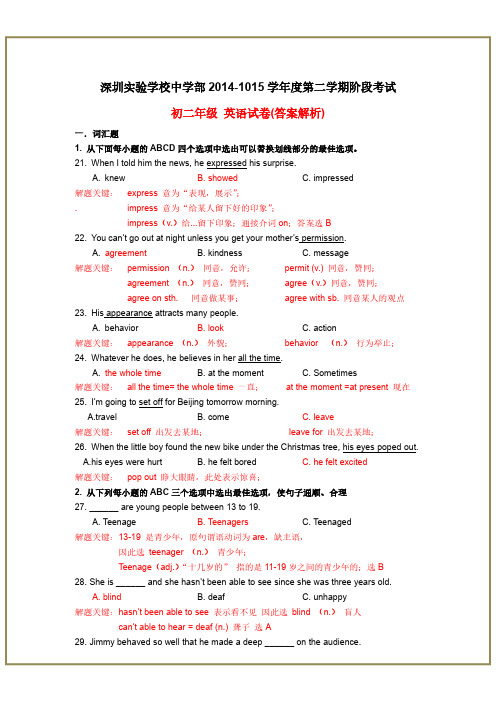
深圳实验学校中学部2014-1015学年度第二学期阶段考试初二年级英语试卷(答案解析)一.词汇题1.从下面每小题的ABCD四个选项中选出可以替换划线部分的最佳选项。
21.When I told him the news,he expressed his surprise.A.knewB.showedC.impressed解题关键:express意为“表现,展示”;.impress意为“给某人留下好的印象”;impress(v.)给...留下印象;通接介词on;答案选B22.You can’t go out at night unless you get your mother’s permission.A.agreementB.kindnessC.message解题关键:permission(n.)同意,允许;permit(v.)同意,赞同;agreement(n.)同意,赞同;agree(v.)同意,赞同;agree on sth.同意做某事;agree with sb.同意某人的观点23.His appearance attracts many people.A.behaviorB.lookC.action解题关键:appearance(n.)外貌;behavior(n.)行为举止;24.Whatever he does,he believes in her all the time.A.the whole timeB.at the momentC.Sometimes解题关键:all the time=the whole time一直;at the moment=at present现在25.I’m going to set off for Beijing tomorrow morning.A.traveleC.leave解题关键:set off出发去某地;leave for出发去某地;26.When the little boy found the new bike under the Christmas tree,his eyes poped out.A.his eyes were hurtB.he felt boredC.he felt excited解题关键:pop out睁大眼睛,此处表示惊喜;2.从下列每小题的ABC三个选项中选出最佳选项,使句子通顺、合理27.______are young people between13to19.A.TeenageB.TeenagersC.Teenaged解题关键:13-19是青少年,原句谓语动词为are,缺主语,因此选teenager(n.)青少年;Teenage(adj.)“十几岁的”指的是11-19岁之间的青少年的;选B28.She is______and she hasn’t been able to see since she was three years old.A.blindB.deafC.unhappy解题关键:hasn’t been able to see表示看不见因此选blind(n.)盲人can’t able to hear=deaf(n.)聋子选A29.Jimmy behaved so well that he made a deep______on the audience.A.impressionB.requirementmunication解题关键:固定搭配make a deep impression on sb.给某人留下了深刻印象;选A requirement=require+ment=必要物质;必需品;communication(n.)交流;30.Your eating habits have______your health.A.effect toB.effect onC.result of解题关键:have effect on对......有影响;选B31.From his______,we can imagine the_____of the island.A.describe;mysteriousB.describtion;mysteryC.description;mystery解题关键:从语法角度分析此处缺少两个名词;排除A;又因为B拼写错误,排除B;describe(v.)描述;通接to sb.description(n.)描述;mystery(v.)秘密;神秘mysterious(adj.)神秘的;32.Yesterday I______an invitation from Tom but I didn’t______it.A.received;acceptedB.accepted;receivedC.received;accept解题关键:看时态,过去式,出现助动词,助动词后谓语动词应该用原型,答案选C;accept(v.)主观的接受;receive(v.)客观的接受;33.--Why should red dresses______on the Wedding in China?--Because red is a______of good luck.A.be worn;symbolB.wear;symbolC.be worn;reason解题关键:分析语法,被动语态,考虑be done形式;排除B;根据意思,”红色代表好运”;symbol(n.)象征;代表;因此答案选A34.--The movie star appears to be______his forties.--He is53years old.Most of the______look younger than their real age.A.on;actorsB.in;actorsC.in;director解题关键:固定搭配:in one’s forties在某人四十多岁的时候;the movie star表明身份是actor;谓语动词是look,因此是:actors选B;35.--Thank you for coming to see me.--______.A.It’s a pleasure.B.With pleasure.C.No problem.解题关键:口语中回答别人寻求帮助的时候:--Can I help you?--Yes,it’s my pleasure.回答别人的感谢的时候:--Thank you so much.--It’s my pleasure.36.--______!A car is coming.--Playing football should be full of______,but playing in the street is too dangerous. A.Look at;dream B.Look out;dream C.Look out;fun解题关键:根据句意:look out=watch out=be careful小心;Be full of fun充满欢乐;答案选C37.--Mom,Tom and Jerry is so interesting that I can’t stop______it again.--But I have to give you a(n)______.Watching too much TV isn’t good for your eyes.A.to watch;warningB.watching;warningC.to watch;example解题关键:固定搭配can’t help doing sth.情不自禁做某事儿;give sb.a warning给某人一个警告;答案选B38.--Do you have difficulty______the work in two days?--Of course not.It’s easy______me to do it.A.finishing;forB.finishing;ofC.to finish;forD.to finish;of解题关键:固定搭配have difficulty/trouble/problems(in)doing sth.做某事有困难;It’s easy for sb.to do sth.对某人而言做某事很容易;答案选A;39.--Do you______money for the house?--No.I am too busy______it.A.spend;to doB.pay;to doC.spend;doingD.pay;doing解题关键:固定搭配+句意sb.pay money for sth.某人为某事付钱;too adj.to do sth.太...至于不能做某事;答案选B40.--They should raise______spirits to face difficulties.--We’d better______them.A.their;encourageB.their;to encourageC.them;encourageD.them;to encourage解题关键:固定搭配raise one’s spirit唤起某人的勇气;had better do sth.最好做某事;41.--Children here are_____from different illnesses.--We must do something______them.A.suffering;to helpB.suffering;helpC.running;to helpD.running,help 解题关键:固定搭配suffer from遭受灾难或是疾病;to do sth.表示目的;答案选A 42.--Great changes have______in my hometown.--Yes.Look!There______many beautiful parks and buildings now.A.taken place;wereB.taken off;wereC.taken place;areD.taken off;are解题关键:句意+就近一致take place发生;take off起飞;脱掉;成功;There be句型遵循就近一致的原则;答案选C43.--What should I do if I______with you?--You should______your head.A.will agree;nodB.agree;nodC.will agree;loseD.agree;lose解题关键:if引导条件状语从句,遵循“主情从现”;根据句意,表示肯定是需点头;答案选B44.--______the thief______by the policeman?--Yes.Mr.Wang caught him while he was having lunch in a small restaurant.A.Has;caughtB.Does;catchC.Has;been caughtD.Is;catching解题关键:时态后句回答事情发生在过去,且此动作已经完成,所以用“完成时”,又因为是现在此刻在对话,所以用的是“现在完成时have/has done sth.”答案选C 45.--I______to a party,but I have got nothing to wear.--Why don’t you______a dress for the party?A.would be invited;to buyB.will invite;buyC.have invited;buyD.have been invited;buy解题关键:时态+固定搭配根据后文句意“我已经被邀请”,所以使用被动语态,使用”have been done”;why not do sth.表示的是“为什么不做某事...”46.--We can use QQ to communicate with each other online.--Really?Could you please show me______it?A.what to doB.how to doC.when to doD.why do解题关键:根据句意“你能展示一下怎么做吗?”“how to do”怎么做某事;答案选B;47.It is a problem that doesn’t need______right now.A.to solveB.solvingC.being solvedD.to be solving解题关键:主动形式表被动want/need/require doing sth.表示”某事需要被做”;答案选B48.These animations are worth______.A.watchingB.watchC.to watchD.be watch解题关键:主动形式表示被动be worth doing sth.某事儿值得被做答案选A49.The machines are made______at full speed.A.workB.workingC.to workD.to be worked解题关键:使役动词的被动句中to需要添加;答案选C;使役动词:表示“使,让,帮,令,叫”主动句时:let/make sb.do sth.被动句时:be made to do sth.50.All of us are looking forward to______the30th anniversary of SZSY.A.haveB.havingC.takeD.have had解题关键:固定搭配look forward to doing sth.期待做某事儿;二.完形填空It was early summer,and the weather was really hot.Mike’s mom told him that theywould be going to be beach on Saturday.Mike was___51___.He couldn’t wait to practice swimming.The drive to the beach was only an hour,but it seemed___52___to Mike.Finally, they___53___the beach.Mike helped his mom take the beach blankets,his sand toys and some snacks out of the car.Mom found a good place on the sand and put the ___54___down.Sitting close to them was a boy at about Mike’s age.He came over and ___55___his name was Gary and asked if Mike wanted to build a___56___castle with him.Mike___57___.The two boys built a great sand castle.They decided to dabble in water.The boys ran in and out of the water and jumped through the waves___58___.Suddenly,they ran to jump in a big wave,but Mike couldn’t find Gary.Mike looked around and finally saw him waving his hands shouting for___59___.Mike swam to Gary and took him out of the water.Since then,the boys became___60___and so did their moms.51. A.surprised B.excited C.nervous52. A.years B.minutes C.moments53. A.reached B.saw C.mentioned54. A.car B.toys C.blankets55. A.said B.spoke C.called56. A.sand B.wooden C.brick57. A.agreed B.promised C.refused58. A.crying B.fighting ughing59. A.fight B.help C.happiness60. A.friends B.classmates C.brothers51.答案选B根据后文“He couldn’t wait to practice swimming.”表明Mike很兴奋;52.答案选A根据后文“but”,表明尽管一小时,但是对于Mike而言却像是一年;53.答案选A到达某地reach sp.54.答案选C根据后文“Sitting close to them”,能坐在上面的,只有毯子blanket;55答案选A say+sth.指说的具体内容;speak+语言;call sb.呼叫某人;56答案选A根据beach得出,沙滩上面有sand;后文也有sand castle出现;57答案选A后文两人去海里玩儿了,所以选agree;58答案选C表示玩儿得很开心laughing;59答案选B shout for help呼叫救命;60答案选A become friends成为朋友;三.阅读理解ATwo ill patients were sitting on a hospital bed.One man was allowed to sit up in his bed for an hour each afternoon.His bed was next to the room’s only window.The other61B man had to spend all his time flat on his back.The men talked for hours.Every afternoon the man by the window would describe to his roommate all the things he could see outside the window.The other man loved these moments.It was only then that he could“see”the outside world.The window overlooked a park with a lovely lake Couples walked arm in arm.Big old trees dotted the landscape.The beautiful city skyline could be seen in the distance.However,one morning the nurse discovered that the man next to the window had died.Soon the body was taken away.After an hour,the other man asked if he could be moved next to the window.Slowly,the man propped himself up to take his first look at the world outside.It faced a blank wall.The man asked the nurse why the other man would lie.The nurse responded that the man was blind.She said:“Perhaps he just wanted to encourage you.”Today will never come again.Be a friend.Encourage someone.Take time to care.Let your words heal and not wound.64A/B/D61.How many windows are there in the room?A.noneB.oneC.twoD.there细节题His bed was next to the room’s only window.知房间里面只有一个窗户选B62.The underlined word“dotted”in the passage means“____”in Chinese.A.美化B.位于C.隐藏在D.点缀词语猜词题Big old trees dotted the landscape通过对文章的分析,得出树木是点缀了周围的环境dot意为点缀。
2023-2024学年广东省深圳八年级下学期英语期中模拟考(无答案)
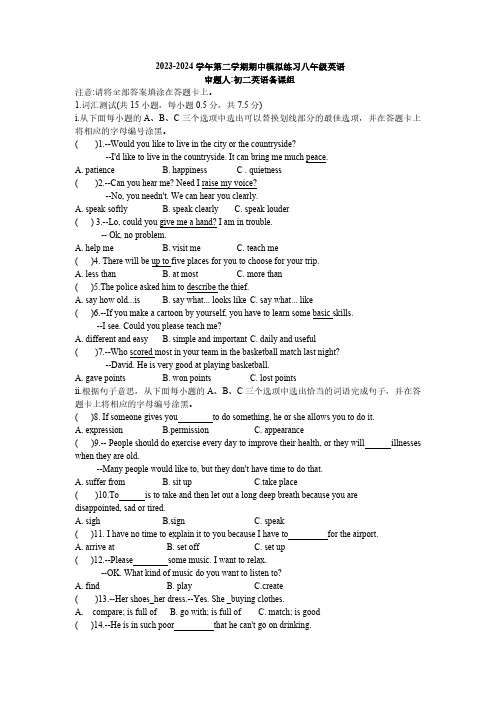
2023-2024学年第二学期期中模拟练习八年级英语审题人:初二英语备课组注意:请将全部答案填涂在答题卡上。
1.词汇测试(共15小题,每小题0.5分,共7.5分)i.从下面每小题的A、B、C三个选项中选出可以替换划线部分的最佳选项,并在答题卡上将相应的字母编号涂黑。
( )1.--Would you like to live in the city or the countryside?--I'd like to live in the countryside. It can bring me much peace.A. patienceB. happiness C . quietness( )2.--Can you hear me? Need I raise my voice?--No, you needn't. We can hear you clearly.A. speak softlyB. speak clearlyC. speak louder( ) 3.--Lo, could you give me a hand? I am in trouble.-- Ok, no problem.A. help meB. visit meC. teach me( )4. There will be up to five places for you to choose for your trip.A. less thanB. at mostC. more than( )5.The police asked him to describe the thief.A. say how old...isB. say what... looks likeC. say what... like( )6.--If you make a cartoon by yourself, you have to learn some basic skills.--I see. Could you please teach me?A. different and easyB. simple and importantC. daily and useful( )7.--Who scored most in your team in the basketball match last night?--David. He is very good at playing basketball.A. gave pointsB. won pointsC. lost pointsii.根据句子意思,从下面每小题的A、B、C三个选项中选出恰当的词语完成句子,并在答题卡上将相应的字母编号涂黑。
8下英语-实验学校-期中试卷+答案
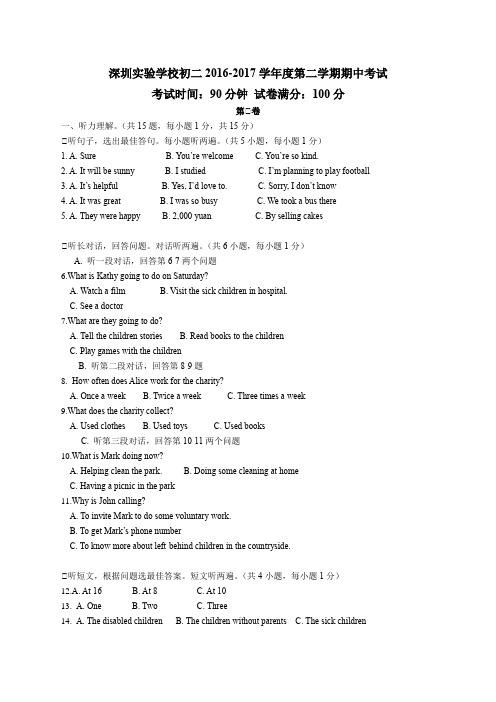
深圳实验学校初二2016-2017学年度第二学期期中考试考试时间:90分钟试卷满分:100分第Ⅰ卷一、听力理解。
(共15题,每小题1分,共15分)Ⅰ听句子,选出最佳答句。
每小题听两遍。
(共5小题,每小题1分)1. A. Sure B. You’re welcome C. You’re so kind.2. A. It will be sunny B. I studied C. I’m planning to play football3. A. It’s helpful B. Yes, I’d love to. C. Sorry, I don’t know4. A. It was great B. I was so busy C. We took a bus there5. A. They were happy B. 2,000 yuan C. By selling cakesⅠ听长对话,回答问题。
对话听两遍。
(共6小题,每小题1分)A. 听一段对话,回答第6-7两个问题6.What is Kathy going to do on Saturday?A. Watch a filmB. Visit the sick children in hospital.C. See a doctor7.What are they going to do?A. Tell the children storiesB. Read books to the childrenC. Play games with the childrenB. 听第二段对话,回答第8-9题8.How often does Alice work for the charity?A. Once a weekB. Twice a weekC. Three times a week9.What does the charity collect?A. Used clothesB. Used toysC. Used booksC. 听第三段对话,回答第10-11两个问题10.What is Mark doing now?A. Helping clean the park.B. Doing some cleaning at homeC. Having a picnic in the park11.Why is John calling?A. To invite Mark to do some voluntary work.B. To get Mark’s phone numberC. To know more about left-behind children in the countryside.Ⅰ听短文,根据问题选最佳答案。
2020-2021学年广东省深圳市福田区实验中学八年级下学期期中英语试卷
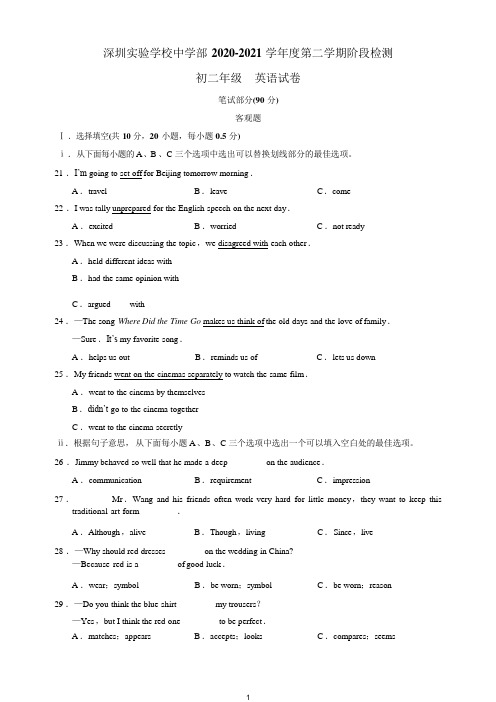
深圳实验学校中学部2020-2021学年度第二学期阶段检测初二年级英语试卷笔试部分(90分)客观题Ⅰ.选择填空(共10分,B 、C 三个选项中选出可以替换划线部分的最佳选项。
21 .I’m going to set off for Beijing tomorrow morning .A .travelB .leaveC .come22 .I was tally unprepared for the English speech on the next day .A .excitedB .worriedC .not ready23 .When we were discussing the topic ,we disagreed with each other .A .held different ideas withB .had the same opinion withC .argued with24 .—The song Where Did the Time Go makes us think of the old days and the love of family .—Sure .It’s my favorite song .A .helps us outB .reminds us ofC .lets us down25 .My friends went on the cinemas separately to watch the same film .A .went to the cinema by themselvesB .didn’t go to the cinema togetherC .went to the cinema secretlyⅱ.根据句子意思,从下面每小题A 、B 、C 三个选项中选出一个可以填入空白处的最佳选项。
26 .Jimmy behaved so well that he made a deep ________ on the audience .A .communicationB .requirementC .impression27 .________ Mr .Wang and his friends often work very hard for little money ,they want to keep thistraditional art form ________ .A .Although ,aliveB .Though ,living28 .—Why should red dresses ________ on the wedding in China?—Because red is a ________ of good luck .A .wear;symbolB .be worn;symbol29 .—Do you think the blue shirt ________ my trousers?—Yes ,but I think the red one ________ to be perfect .A .matches;appearsB .accepts;looksC .S ince ,liveC .be worn;reason C .compares;seems20小题,每小题0.5分)ⅰ.从下面每小题的A 、30 .Betty and her friends visited the children who ________ serious illnesses in hospital and ________ apainting competition for them .A .s uffered from ,orderedB .played against ,organizedC .s uffered from ,organizedⅲ.从下面每小题的A 、B 、C 、D 四个选项中选出可以填入空白处的最佳选项。
广东省专版 深圳市中学八年级(下)期中英语试卷 附答案
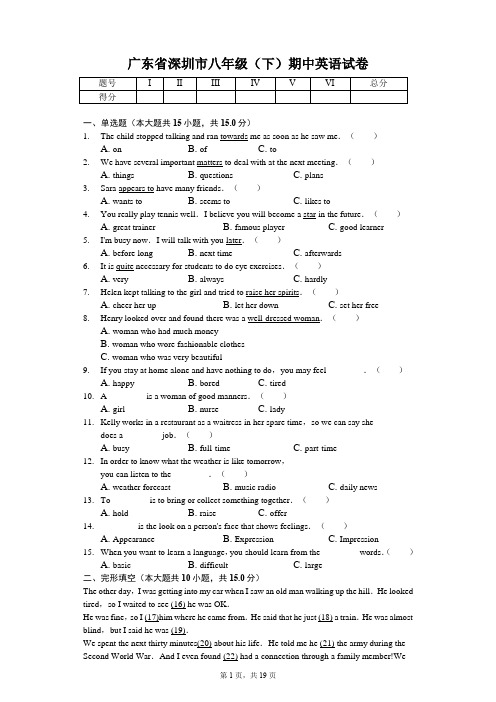
广东省深圳市八年级(下)期中英语试卷一、单选题(本大题共15小题,共15.0分)1.The child stopped talking and ran towards me as soon as he saw me.()A. onB. ofC. to2.We have several important matters to deal with at the next meeting.()A. thingsB. questionsC. plans3.Sara appears to have many friends.()A. wants toB. seems toC. likes to4.You really play tennis well.I believe you will become a star in the future.()A. great trainerB. famous playerC. good learner5.I'm busy now.I will talk with you later.()A. before longB. next timeC. afterwards6.It is quite necessary for students to do eye exercises.()A. veryB. alwaysC. hardly7.Helen kept talking to the girl and tried to raise her spirits.()A. cheer her upB. let her downC. set her free8.Henry looked over and found there was a well-dressed woman.()A. woman who had much moneyB. woman who wore fashionable clothesC. woman who was very beautiful9.If you stay at home alone and have nothing to do,you may feel ________.()A. happyB. boredC. tired10. A ________ is a woman of good manners.()A. girlB. nurseC. lady11.Kelly works in a restaurant as a waitress in her spare time,so we can say shedoes a ________ job.()A. busyB. full-timeC. part-time12.In order to know what the weather is like tomorrow,you can listen to the ________.()A. weather forecastB. music radioC. daily news13.To ________ is to bring or collect something together.()A. holdB. raiseC. offer14.________ is the look on a person's face that shows feelings.()A. AppearanceB. ExpressionC. Impression15.When you want to learn a language,you should learn from the ________ words.()A. basicB. difficultC. large二、完形填空(本大题共10小题,共15.0分)The other day,I was getting into my car when I saw an old man walking up the hill.He looked tired,so I waited to see (16) he was OK.He was fine,so I (17)him where he came from.He said that he just (18) a train.He was almost blind,but I said he was (19).We spent the next thirty minutes(20) about his life.He told me he (21) the army during the Second World War.And I even found (22) had a connection through a family member!Welaughed so much that we almost cried.It cost me nothing other than thirty minutes of my(23).I learnt so much,and Albert enjoyed the talking and left smiling.I also had a(n)(24) to thank this great man for all he did to keep the country(25) during the war.Thanks,amazing Albert.You are an inspiration!16. A. if B. why C. but17. A. told B. asked C. kept18. A. got on B. drove away C. got off19. A. clever B. great C. lucky20. A. asking B. thinking C. talking21. A. joined B. held C. invited22. A. we B. they C. he23. A. money B. time C. afternoon24. A. friend B. plan C. opportunity25. A. clean B. happy C. safe.三、阅读理解(本大题共20小题,共30.0分)ATwo hunters rented(租用)a small plane to fly them to a forest.They told the pilot to come back and pick them up in about two weeks.By the end of the two weeks,they had hunted a lot of animals and they wanted to put all of them onto the plane.But the pilot said,"This plane can only take one lamb.You'll have to leave the others behind." Then one hunter said,"But last year,another pilot with the same plane let us take two lambs and some other animals onto the plane."So the new pilot thought about it.Finally he said,"OK,since you did it last year,I think this year we can do it again."Then they put all the animals they had hunted onto the plane,and the plane took off.Five minutes later,it crashed.The three men looked around,and one hunter asked the other one,"Where do you think we are now?"The other hunter looked around and said,"I think we're about one mile away from the place where the plane crashed last year."26.The two hunters stayed in the forest for ______ .A. one weekB. two weeksC. one yearD. two years27.What did the two hunters do in the forest?______A. They took a holiday in the forest.B. They learned how to fly a plane.C. They hunted a lot of animals.D. They found some lambs.28.What did the two hunters take onto the plane at last?______A. Nothing.B. One lamb.C. Two lambs.D. All the animals they hunted.29.This year,what happened to the plane at last?______A. It crashed.B. It didn't work.C. It landed on an island.D. It only flew one mile.30.What can we infer from the passage?______A. The two hunters knew the pilot before.B. The two hunters come to the forest every year.C. The new pilot didn't know the plane would crash at first.D. The plane the two hunters took last year also crashed after flying five minutes.BZach has a stepson,Bradley.One day,Zach drove over to meet Bradley.Bradley was a student in a high school.He neither liked nor disliked Zach,even though he had known Zach for three years.Zach was still trying to get along with Bradley.He told Bradley that he was coming over.Bradley said OK.When Zach got there,he asked if Bradley wanted to drive his car.Bradley had a driver's license.Bradley said all right.Zach told him not to drive too fast,but he could drive anywhere he wanted.Bradley got on the 210Road and headed northwest.Zach gave Bradley a few driving tips:Don't drive next to big cars;don't drive behind trucks with goods…On their way back,Zach suggested that they stop at the golf course(高尔夫球场).He wanted to show Bradley how to play golf.But Bradley didn't like it;he liked his video games.However,Bradley soon found that playing golf was fun and he did very well.The next day,Bradley,for the first time,called Zach.Bradley asked if Zach would come the next Saturday,so they could take a drive and go to the golf course again.Zach said yes,with a happy feeling in his heart.31.How did Bradley like his stepfather at first?______A. He liked him.B. He disliked him.C. He thought his stepfather was a good man.D. He neither liked nor disliked him.32.What does the underlined word"license"mean in Chinese?______A. 身份证.B. 执照.C. 护照.D. 银行卡.33.The reason why Zach tried to get along with Bradley is that ______ .A. he didn't know how to spend his timeB. he wanted to improve his relationship with BradleyC. he wanted to show what he could do well inD. he wanted to teach Bradley as a father34.The last sentence in the passage implies that ______ .A. Zach had never been happy beforeB. Zach was not easy to get along withC. Zach found hope in what he had doneD. Zach shared the same hobby with Bradley35.What's the main idea of the passage?______A. What Zach did in his spare time.B. How Zach got on well with his stepson.C. Zach taught Bradley how to play golf.D. Zach was good at driving and playing golf.CA smuggler(走私犯)drove to the border.When a soldier looked in the truck,he was surprised to find six big bags."What's in them?"the soldier asked."Dirt,"the smuggler answered."Take them out,"the soldier said."I want to check them."The smuggler opened the bags,and sure enough,each one of them was filled with dirt.So thesoldier let him go.A week later,the smuggler came back,and once again,the soldier looked in the truck."What's in the bags this time?"he asked."Dirt,more dirt,"said the smuggler.Not believing him,the soldier checked the bags and,once again,he found nothing but dirt.The same thing happened every week for six months,and the soldier finally became so frustrated(沮丧的)that he left and worked as a waiter in a restaurant.Then one night,the smuggler went to the restaurant and had a drink.The waiter saw him and said,"Listen!Drinks are free tonight if you tell me what you were smuggling all that time."Slowly,the smuggler got close to the waiter and said,"Trucks."36.The soldier found ______ bags in the smuggler's truck for the first time.A. fourB. fiveC. sixD. seven37.When the smuggler came again a week later,the soldier ______ .A. let him go without checkingB. invited him to a restaurantC. checked and found nothing but dirtD. left and became a waiter in a restaurant38.Why did the soldier feel frustrated?______A. Because he couldn't find what the smuggler smuggled.B. Because he wanted to become a smuggler.C. Because he wanted to work in a restaurant.D. Because his work was too boring.39.What did the smuggler smuggle all that time?______A. Dirt.B. Drinks.C. Trucks.D. Foods.40.Where is the passage probably taken from?______A. An advertising book.B. A poster.C. A fashion magazine.D. A joke book.DMy life plan is to visit all the states in the US.Several years ago,my husband and I were traveling in the northwest.One day,when we were having our breakfast,I lost my wallet that had over 300in it.There was no way for us to be able to find it,but we went on with our trip.We went off to drive around and enjoy the city,completely forgetting my missing wallet.Later on,when I checked my phone,there was a message from the boss of the restaurant where we had our breakfast:"I have something that belongs to you,and you're going to be very happy."We got back to the restaurant and there was the wallet on the table with all the money in it! The boss's son found the wallet in front of the door,and brought it to him.He thought that it must belong to someone who had a meal in the restaurant,so he checked inside and found my phone number on a piece of paper.41.Where were the writer and her husband when she lost her wallet?______A. They were in their hometown.B. They were in the southwest of the US.C. They were in the northeast of the US.D. They were in the northwest of the US.42.According to the passage,we can say that ______ .A. the writer always lost things during her tripsB. the message was a good surprise to the writerC. the wallet was not important for the writerD. the writer didn't mind that she had lost her wallet43.Which of the following is TRUE according to the passage?______A. The writer lost her way when she was looking for her wallet.B. The writer finally found her wallet under the table of the restaurant.C. It was in front of the restaurant's door that the wallet was found.D. The boss's son knew the writer's phone number and called her.44.What can we know from the passage?______A. The boss of the restaurant knew the writer before.B. The writer was thankful to the boss of the restaurant.C. The writer knew someone would bring back her wallet.D. The writer wasn't upset when she found that her wallet was missing.45.Which of the following words can describe the boss best?______A. Interesting.B. Nice.C. Hard-working.D. Stupid.四、阅读填空(本大题共1小题,共10.0分)46.One year ago,eleven of my friends and I got together and made a group.We called (28)______ (our)"12Caring Women".We meet once a (29)______ and take turns to hold the activity.We each donate(捐赠)20dollars,so we have 240dollars each month for (30)______ (do)good things.When we (31)______ (meet),we discuss what to do in the month.Last month,we donated the money to a (32)______ lady.She had a baby in an earthquake,but didn't have money (33)______ (raise)her baby.Over the past year,we have helped many people (34)______ need.We work with the government and (35)______ (school).They help us find people in need.If we don't have people to (36)______ in one month,we give the money to the nursing home (养老院).When we help people,we feel very happy.I'm writing this passage (37)______ (ask)more people to join us.五、完成句子(本大题共1小题,共4.0分)47.请用英语描述下图,要求六句话以上.______.六、书面表达(本大题共1小题,共15.0分)48.你知道"施比受更有福"的含义吗?"施"指"给予","受"指"接受","施比受更有福"意为"给予比接受更幸福".请根据下列提示,以"It Is More Blessed to Give than to Receive"为题,写一篇不少于80词的短文.内容提示:1.你的朋友小梅经常去养老院帮忙照顾老人;2.她帮助老人打扫房间、洗衣服、陪老人聊天、照顾生病的老人;3.你问她为什么这么做,她说:"施比受更有福."相关词汇:养老院 the nursing homeIt Is More Blessed to Give than to Receive.答案和解析1.【答案】C【解析】答案:CA 在…上;B…的;C 朝…方向.根据句意"他一看见我就停止谈话并跑向我"可知,"towards"意为"向…方向",故答案为C他一看见我就停止谈话并跑向我.这道题考查的是同义词、近义词的辨析,要根据句意判断出划线词语的意思,然后根据选项选出正确答案.2.【答案】A【解析】答案:AA 事情;B 问题;C 计划.根据句意"下个会议上我们有一些重要的事情要处理."可知,"matters"意为"事情",故答案为A下个会议上我们有一些重要的事情要处理.这道题考查的是同义词、近义词的辨析,要根据句意判断出划线词语的意思,然后根据选项选出正确答案.3.【答案】B【解析】答案:BA 想;B 好像;C 喜欢.根据句意"Sara好像有很多朋友."可知,"appears to"意为"好像",故答案为BSara好像有很多朋友.这道题考查的是同义词、近义词的辨析,要根据句意判断出划线词语的意思,然后根据选项选出正确答案.4.【答案】B【解析】答案:BA 好的教练;B 著名的运动员;C 好的学习者.根据句意"你网球真的打得很好,我相信你将来会成为一个明星的."可知,"star"在此处意为"著名的运动明星",故答案为B你网球真的打得很好,我相信你将来会成为一个明星的.这道题考查的是同义词、近义词的辨析,要根据句意判断出划线词语的意思,然后根据选项选出正确答案.5.【答案】C【解析】答案:CA 不久以后;B 下次;C 随后.根据句意"我非常忙,一会儿再跟你说."可知,"later"意为"一会儿后",故答案为C我非常忙,一会儿再跟你说.这道题考查的是同义词、近义词的辨析,要根据句意判断出划线词语的意思,然后根据选项选出正确答案.6.【答案】A【解析】答案:AA 非常;B 总是;C 几乎不.根据句意"学生做眼保健操非常必要."可知,"quite"意为"非常",故答案为A学生做眼保健操非常必要.这道题考查的是同义词、近义词的辨析,要根据句意判断出划线词语的意思,然后根据选项选出正确答案.7.【答案】A【解析】答案:AA 使她振奋;B 让她失望;C 让她自由.根据句意"Helen不停地跟这个女孩儿交谈,并尽力让她打起精神来."可知,"raise her spirits"意为"让她打起精神",故答案为AHelen不停地跟这个女孩儿交谈,并尽力让她打起精神来.这道题考查的是同义词、近义词的辨析,要根据句意判断出划线词语的意思,然后根据选项选出正确答案.8.【答案】B【解析】答案:BA 很有钱的女士;B 穿着时尚的女士;C 漂亮的女士.根据句意"Henry仔细查看了下,发现一个穿着时尚的女士."可知,"well-dressed woman"意为"穿着时尚的",故答案为BHenry仔细查看了下,发现了一位穿着时尚的女士.这道题考查的是同义词、近义词的辨析,要根据句意判断出划线词语的意思,然后根据选项选出正确答案.9.【答案】B【解析】答案:B,考查形容词词义辨析.句意"如果你待在家里而且没有事做,你可能感到无聊."happy高兴的,bored无聊的;tired疲劳的.根据前句If you stay at home alone and have nothing to do,如果你待在家里而且没有事做.可知是你可能感到无聊.故选B.如果你待在家里而且没有事做,你可能感到无聊.理解各个选项的含义,根据具体内容作答.10.【答案】C【解析】答案:C,考查名词词义辨析.句意"淑女是有良好举止的女人."girl女孩;nurse护士;lady淑女、女士.根据题干A ________ is a woman of good manners.可知应是淑女是有良好举止的女人.故选C.淑女是有良好举止的女人.理解各个选项的含义,根据具体内容作答.11.【答案】C【解析】答案:C,考查形容词词义辨析.句意"凯莉在业余时间在餐馆当服务员,因此我们说她做兼职."busy忙碌的;full-time专职的;part-time兼职的.根据前句Kelly works in a restaurant as a waitress in her spare time,凯莉在业余时间在餐馆当服务员.可知是因此我们说她做兼职.故选C.凯莉在业余时间在餐馆当服务员,因此我们说她做兼职.理解各个选项的含义,根据具体内容作答.12.【答案】A【解析】答案:A,考查名词词义辨析.句意"为了了解明天的天气怎么样,你可以听天气预报."weather forecast天气预报;music radio音乐电台;daily news每日新闻.根据题干In order to know what the weather is like tomorrow.为了了解明天的天气怎么样.可知应该说你可以听天气预报.weather forecast天气预报,固定用法.故选A.为了了解明天的天气怎么样,你可以听天气预报.理解各个选项的含义,根据具体内容作答.13.【答案】B【解析】答案:B,考查名词词义辨析.句意"筹集是一起带来或收集某物."hold控制、拥有;raise募集、加薪;offer提议、提供.根据题干To ________ is to bring or collect something together.可知应该是筹集是一起带来或收集某物.故选B.筹集是一起带来或收集某物.理解各个选项的含义,根据具体内容作答.14.【答案】B【解析】答案:B,考查名词词义辨析.句意"表情是看一个人脸上表现出的感觉."Appearance外貌;Expression表情;Impression印象.根据题干that shows feelings.可知应该是表情是看一个人脸上表现出的感觉.故选B.表情是看一个人脸上表现出的感觉.理解各个选项的含义,根据具体内容作答.15.【答案】A【解析】答案:A,考查形容词词义辨析.句意"当你想学一门语言时,你应该从基本词汇学起."basic基础的、基本的;difficult困难的;large大量的.根据前句When you want to learn a language,当你想学一门语言时.可知应该从基本词汇学起.故选A.当你想学一门语言时,你应该从基本词汇学起.理解各个选项的含义,根据具体内容作答.16.【答案】【小题1】A 【小题2】B 【小题3】C 【小题4】B 【小题5】C【小题6】A 【小题7】A 【小题8】B 【小题9】C 【小题10】C【解析】38.答案:A.考查词语辨析,if是否,why为什么,but但是,根据上文The other day,I was getting into my car when I saw an old man walking up the hill.He looked ti red可以推断出这里指:我等着看他是否没事.故选:A.39.答案:B.考查动词及语境的理解,told告诉,asked询问,kept保持,结合句意:他很好,所以我问他从哪里来.故选:B.40.答案:C.考查词组辨析,get on上车,drive away开走了,get off下车,根据语境可知:他说他刚刚下了火车.故选:C.41.答案:B.考查形容词及语境的理解,clever聪明的,great伟大的,lucky幸运的,结合句意:他几乎失明了,但我说他很好.故选:B.42.答案:C.考查动词及语境的理解,talk about谈论,结合句意:我们在接下来的三十分钟里谈论他的生活.故选:C.43.答案:A.考查固定词组join the army参军,故选:A.44.答案:A.考查人称代词及语境的理解,we我们,they他们,he他,结合句意:我甚至发现我们通过一个家庭成员有了联系.故选:A.45.答案:B.考查名词及语境的理解,money金钱,time时间,afternoon下午,结合句意:除了我三十分钟的时间之外,我什么也没花.故选:B.46.答案:C.考查名词及语境的理解,friend朋友,plan计划,opportunity机会,have an opportunity to do sth.有机会做某事,结合句意:我也有机会感谢这位伟人,他为保卫国家的安全所做的一切.故选:C.47.答案:C.考查形容词及语境的理解,clean干净的,happy高兴的,safe安全的,根据上文He told me he joined the army during the Second World War.可以推断出这里指:我也有机会感谢这位伟人,他为保卫国家的安全所做的一切.故选:C.这篇短文介绍了作者遇到一位老人,他几乎失明了,但是作者认为他了不起,通过半小时的聊天,他告诉作者在第二次世界大战中参军.从他身上学到了很多东西.作者有机会感谢这位伟人,他为保卫国家的安全所做的一切.完型填空题的作答需先通读全文,抓住文章大意,运用语法知识,填写正确的词语形态.26.【答案】【小题1】B 【小题2】C 【小题3】D 【小题4】A 【小题5】C【解析】48.答案:B.细节理解题.根据第一段第二句They told the pilot to come back and pick them up in about two weeks.他们告诉飞行员大约两周后回来接他们.可知这两个猎人在森林里呆了二周.选B.49.答案:C.细节理解题.根据第一段第三句By the end of the two weeks,they had hunted a lot of animals两周后,他们猎杀了许多动物.可知这两个猎人在森林里狩猎了许多动物.选C.50.答案:D.细节理解题.根据文中第四段第二句Then they put all the animals they had hunted onto the plane,and the plane took off.然后他们把所有被猎杀的动物放在飞机上,飞机起飞了.可知他们把所有的猎物搬上了飞机.故选D.51.答案:A.细节理解题.根据第四段最后一句Five minutes later,it crashed.五分钟后,飞机坠毁了.可知五分钟,飞机坠机了.故选A.52.答案:C.细节理解题.根据第五行"OK,since you did it last year,I think this year we can do it again."好吧,既然你去年做了,我想今年我们可以再做一次.可知开始这名新飞行员不知道飞机会坠机.选C.文章大意:这是一篇人物故事类阅读,本文主要讲述两名猎人租用一架飞机去森林打猎,两星期后,飞行员来接他.飞行员不让他们带走这么多的猎物,可是他们说去年带走比这还多.最后他们把所有的猎物装上了飞机.结果五分钟后,飞机坠落了.一个猎人问另一个,"你认为我们现在在哪里?",他说:"我想我们离去年飞机坠毁的地方大约有一英里远.".阅读题型,要注重句子与句子之间、段落与段落之间逻辑关系以及对篇章的整体理解.根据所给问题选择正确选项完成试题.31.【答案】【小题1】D 【小题2】B 【小题3】B 【小题4】C 【小题5】B【解析】53.答案:D.细节理解题.根据第一行第四句He neither liked nor disliked Zach 他既不喜欢也不讨厌扎克,可知布拉德利既不喜欢也不讨厌他的继父,选D.54.答案:B.词义猜测题.根据下句Bradley said all right.Zach told him not to drive too fast,but he could drive anywhere he wanted.布拉德利说好吧,扎克告诉他不要开得太快,但他可以开车到任何他想去的地方.可知,应该是驾驶证"执照",选B.55.答案:B.细节理解题.根据根据第一段第三句He neither liked nor disliked Zach,even though he had known Zach for three years他既不喜欢也不讨厌扎克,尽管他认识扎克已经三年了.可知他想改善他与布拉德利的关系,故选B.56.答案:C.细节理解题.根据第一段He neither liked nor disliked Zach,eventhough he had known Zach for three years.Zach was still trying to get along with Bradley.他既不喜欢也不讨厌扎克,尽管他认识扎克已经三年了.扎克仍在设法与布拉德利相处.可知扎克想改善他们的关系,布拉德利主动要求开车,去打高尔夫球.他看到与布拉德利改善关系的希望.故扎克从内心里感到快乐.选C.57.答案:B.主旨大意题.根据根据第一段He neither liked nor disliked Zach,even though he had known Zach for three years.Zach was still trying to get along with Bradley.他既不喜欢也不讨厌扎克,尽管他认识扎克已经三年了.扎克仍在设法与布拉德利相处.及后面介绍的让他开车,打高尔夫球等,可知,短文主要介绍扎克如何与他继子相处的.选B.文字大意:这是一篇人物故事类阅读,主要介绍扎克与他的继子虽然已经认识三年了.但是他们的关系不是怎么好,他想改善与他的继子的关系,他让他的继子开车和他一起打高尔夫球.最后他们关系好了.阅读题型,要注重句子与句子之间、段落与段落之间逻辑关系以及对篇章的整体理解.根据所给问题选择正确选项完成试题.36.【答案】【小题1】C 【小题2】C 【小题3】A 【小题4】C 【小题5】D【解析】58.答案:C.细节理解题.根据第一行he was surprised to find six big bags.他惊奇地发现六个大袋子.可知,是六个.选C.59.答案:C.细节理解题.根据第九行Not believing him,the soldier checked the bags and,once again,he found nothing but dirt.士兵不相信他,再一次检查了袋子,他发现除了泥土什么也没有.可知,一周后,走私犯又来了,士兵检查了一下,发现除了土以外什么也没有.选C.60.答案:A.细节理解题.根据第九、十行Not believing him,the soldier checked the bags and,once again,he found nothing but dirt.The same thinghappened every week for six months,and the soldier finally became so frustrated 士兵不相信他,再一次检查了袋子,他发现除了泥土什么也没有.两个月里同样的事情每周都发生,士兵最后变得如此沮丧.可知,他查不到走私贩走私什么.选A.61.答案:C.细节理解题.根据最后一句the smuggler got close to the waiter and said,"Trucks."走私贩子走近侍者说:"卡车.",可知,走私犯一直走私卡车.选C.62.答案:D.题材来源题.A一本广告书.B一张海报.C一本时尚杂志.D一本笑话书.短文主要介绍一个走私贩利用运土的方式走私卡车,骗过哨兵的,使得哨兵不得不辞职的事,可知,应该来源一本笑话书.选D.文章大意:这是一篇人物故事类阅读,主要讲一个走私犯开车来到边境,哨兵迎了上去.哨兵在检查汽车行李箱时,惊奇地发现了六个大口袋."里面装的是什么?"他问道."土.",经过检查,口袋里除了土以外,别无他特.哨兵很不情愿地让他通过了.同样的事情一共持续了六个月.最后,哨兵被弄得灰心丧气,干脆辞职去当了酒吧侍者.有天夜里,那个形迹可疑的人碰巧途经酒吧,他问这个人如果告诉我走私的是什么就喝酒免费,这个走私贩说:"卡车.".阅读题型,要注重句子与句子之间、段落与段落之间逻辑关系以及对篇章的整体理解.根据所给问题选择正确选项完成试题.41.【答案】【小题1】D 【小题2】B 【小题3】C 【小题4】B 【小题5】B【解析】63.答案:D.细节理解题,根据Several years ago,my husband and I were traveling in the northwest.One day,when we were having our breakfast,I lost my wallet that had over 300 in it.可知:他们在美国西北部旅行时,有一天吃早饭,作者弄丢了钱包.故选:D.64.答案:B.推理判断题,根据One day,when we were having our breakfast,Ilost my wallet that had over 300in it.There was no way for us to be able to find it,but we went on with our trip.可知:作者弄丢了钱包,没有办法找到它,而这对他们来说是非常重要的.结合下文:We went off to drive around and enjoy the city,completely forgetting my missing wallet.可知:他们很喜欢这个城市的美景,因而忘记了丢失的钱包.可以猜测出:作者没有希望找到自己的钱包.根据Later on,when I checked my phone,there was a message from the boss of the restaurant where we had our breakfast:"I have something that belongs to you,andyou're going to be very happy."可以推断出:这消息对作者来说是一个意外的惊喜.故选:B.65.答案:C.细节理解题,根据The boss's son found the wallet in front of the door,and brought it to him.可知:作者的钱包是在饭店门前找到的.故选:C.66.答案:B.推理判断题,阅读全文可以知道:作者钱包里没有多少钱(I lost my wallet that had over 300 in it.),无法找到它(There was no way for us to be able to find it,but we went on with our trip.)然而,在旅行的某一天,接到饭店老板的信息(Later on,when I checked my phone,there was a message from the boss of the restaurant where we had our breakfast:"I have something that belongsto you,and you're going to be very happy.")可以推断出:作者很高兴找到钱包,因此:作者应该对饭店的老板表示谢意.故选:B.67.答案:B.推理判断题,interesting有趣的,nice友好的,好的;hard-working 勤奋的,stupid愚蠢的,根据短文内容可知:饭店里的老板把他儿子捡到的钱包归还给物主,这说明他是友好的.故选:B.这篇短文讲述了作者在美国西北部旅行时,弄丢了自己的钱包.饭店里的老板的儿子捡到钱包并归还给作者的拾金不昧的故事.首先通读全文,了解文章大意,然后弄清题干意思,对照短文信息确定正确答案.46.【答案】【小题1】ourselves【小题2】month【小题3】doing【小题4】meet【小题5】poor【小题6】to raise【小题7】in【小题8】schools【小题9】help【小题10】to ask【解析】28.答案:ourselves.考查代词.句意"我们称___为‘12个有同情心的女人'".可知,用our的反身代词ourselves我们自己.29.答案:month.考查名词.句意"我们每__开会一次,轮流举行活动.".根据第三行we discuss what to do in the month我们讨论这个月要干什么.可知,应该是每个"月".由a一个.可知,用month.30.答案:doing.考查动名词.句意"所以我们每个月都有240美元用来做好事.".介词for后用do的动名词doing做.31.答案:meet.考查动词.句意"我们见面时,我们讨论这个月该做什么.".由主句discuss动词原形.可知,一般现在时态,主语we我们.谓语动词用原形meet见面.32.答案:poor.考查形容词.句意"上个月,我们把钱捐给了一个___女人.".根据下一句She had a baby in an earthquake,but didn't have money 她在地震中生了一个孩子,但没有钱.可知,应该是"穷的".填形容词poor.33.答案:to raise.考查不定式.句意"但是没有钱抚养她的孩子.".这里用不定式做定语.填to raise抚养.34.答案:in.考查搭配.句意"在过去的一年里,我们帮助了许多需要帮助的人.".in need需要帮助的.固定搭配.填介词in.35.答案:schools.考查名词.句意"我们与政府和学校合作.".and连接并列成分.这里的government是集合名词.学校不止一个,因此用school的复数schools学校.。
广东省深圳市2022-2023学年八年级下学期英语期中模拟(含答案)

广东省深圳市2022-2023学年八年级下学期英语期中模拟一、完形填空完形填空Is the art of conversation dying? The other day, my wife 1.two teenage children did something we haven't 2.for ages. It didn't require the Internet, a TV screen, batteries…or anything else for that matter. But we all 3.it so much that we're thinking of doing-it again sometime.We had a conversation. The kind of real, live conversation was 4.when I was growing up, but it seems all too rare these days. Today we have chat rooms, text messages, e-mails... but we seem to be losing the5.of communicating face to face. We all know 6.young people are out on a date 约会these days, they spend most of the time 7.their mobile phones. And teenagers nowadays seem to 8.to communicate with their friends by sending text messages rather than actually 9.to them.If we carry on like this, in the future, we'll lose the use of our 10.. What do you think? E-mail me, and who knows? Maybe we could even have a real conversation about it!1.A.and B.or C.but D.after2.A.made B.known C.done D.seen3.A.act B.blame C.decide D.enjoy 4.A.common B.careful C.extra D.enough5.A.name B.art C.attention D.aim6.A.because B.how C.when D.unless7.A.buying B.collecting C.repairing D.answering 8.A.dislike B.prefer C.admire D.believe9.A.write B.introduce C.speak D.hurry10.A.eyes B.voice C.mouths D.hands二、阅读理解阅读短文,回答问题Point at (指)something in the room. It is not polite to point with the index finger (食指)in the Middle and Far East.Making a "V" means "Victory" in most parts of Europe when you make this sign with your palm (手掌) facing away from you.Use a circle with fingers to show "OK". This means "OK" in the U. S. and in many countries around the world. In Japan, this means "money". In France, it has the meaning of "zero".Pass a thing to someone with one hand. In Japan this is very rude (粗鲁的). In many Middle and Far Eastern countries it is rude to pass something with your left hand.11.It is ____ to point with the index finger in the Middle East.A.rude B.polite C.necessary D.important12.The underlined word "sign" means ____ in Chinese.A.标志B.图画C.欢呼D.说明13.Using a circle with fingers shows ____ in Japan.A.OK B.zero C.money D.victory14.What's WRONG according to the passage?A.It is rude to point at something with the index finger in the Far East.B.A "V" means "Victory" in most parts of Europe when you make the palm face you.C.It is rude to pass a thing to someone with one hand in Japan.D.It is polite to pass something with your right hand in Middle and Far Eastern countries.15.What's the main idea of the passage?A.How to pass a thing.B.The body language.C.How to show "OK".D.Different signs.阅读短文,回答问题Do you know how to have a good relationship? There are some tips of successful relationships.Communicate. Communication is the important part of every good relationship. When you first start seeing one another, it may be all about body, but long relationships need love and communication.Listen. Listening is as important as talking. Listen to what your partner is telling you in words. And "listen" to his or her body language.Share goals. What do you want to be in a year? In 5 years? Having shared goals is a key to how to have a good relationship.Common (共同的) activities. You should do some things together. Do you both like hiking, playing, or singing? Common activities can allow you to spend time doing things together.Give space (空间). How to have a good relationship needs that you give your partner space to pursue (追求) his or her interests too.Learn to take. Some people are more comfortable (舒服的) with giving than taking. Don't be afraid of taking those things which your partner gives.16.How many tips are there in the passage?A.Four.B.Five.C.Six.D.Seven.17.Why do you need to give your partner space?A.Because he has his own interest.B.Because he doesn't want to have a good relationship.C.Because he wants you to give him some things.D.Because he doesn't want to listen to you at all.18.The underlined phrase "be afraid of" means ____.A.wait for B.worry about C.talk about D.look for19.Which is WRONG according to the passage?A.A long relationship needs love and communication.B.Listening is not as important as talking.C.Sharing goals is a key to have a good relationship.D.Common activities can give you time to do things together.20.What is the main idea of the passage?A.How to pursue your interest in life.B.A good relationship is very important in life.C.We should spend time playing with our friends.D.How to have a good relationship.阅读下面短文,从所给的四个选项中选出能回答所提问题或完成所给句子的一个最佳答案。
广东省深圳市罗湖区深圳中学2023-2024学年八年级下学期期中英语试题(含答案)

2023-2024学年第二学期期中考试八年级英语试卷说明:1.答题前,务必将自己的姓名、学号等填写在答题卷规定的位置上。
2.考生必须在答题卷上按规定作答:凡在试卷、草稿纸上作答的,其答案一律无效。
3.全卷共8页,考试时间70分钟,满分75分。
第一部分选择题(50分)Ⅰ.完形填空(10分)阅读下面短文,从短文后所给的A、B、C、D四个选项中选出能填入相应空白处的最佳选项,并在答题卷上将相应的字母编号涂黑。
(共10小题,每小题1分)Recently, my daughter reminded me of someone we saw at the train station a few years ago.That day, my daughter and I were waiting for our train. We went to 1 some drinks, and there we saw an old man. Dressed 2 , he was standing in front of the counter while counting coins slowly to buy just one bottle of water. The businessman 3 him said impatiently, “Hey! We are in line. Can’t you be quick? Some of us have a train 4 !” Hearing this, the old man felt very embarrassed(尴尬的), so he walked away quietly 5 .It was my turn. I bought us two drinks and the old man’s 6 as well. We walked up to him and gave him the water with a smile. After walking away, my daughter said unhappily, “Dad, the old man is so 7 . He didn’t even say ‘thank you’ to us!” I told her that we did this not to get a “thank you” from other people. We just wanted to be nice.Now, my daughter always reaches out to help people. She always waves her hands, makes a 8 on others and says “hi” to people on the street. She holds doors for people. She usuall y 9 things that people drop and returns to them.When I mentioned this recently, she looked surprised. I asked her 10 she was so kind all the time. She said, “Because it is just right to be that way.” Then she added, “And because I see you do that all the time.”()1.A.change B.use C.make D.buy()2.A.poorly B.smartly C.brightly D.darkly()3.A.beside B.behind C.between D.beyond()4.A.to make B.to catch C.to find D.to drive()5.A.at once B.at times C.on time D.at present()6.A.juice B.cola C.water D.milk()7.A.impatient B.impossible C.imperfect D.impolite()8.A.funny expression B.good speechC.nice impression D.close contact()9.A.picks up B.takes out C.throws away D.gives up()10.A.when B.why C.what D.howⅡ.阅读理解(40分)第一节阅读下列三篇短文,从下面每小题的A、B、C、D 四个选项中选择最佳选项,并在答题卷上将相应的字母涂黑。
广东省深圳市八年级下学期期中考试英语试题(一)
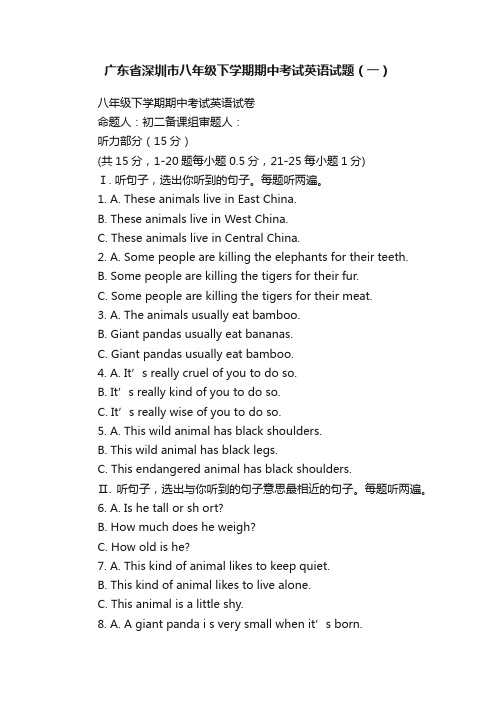
广东省深圳市八年级下学期期中考试英语试题(一)八年级下学期期中考试英语试卷命题人:初二备课组审题人:听力部分(15分)(共15分,1-20题每小题0.5分,21-25每小题1分)Ⅰ. 听句子,选出你听到的句子。
每题听两遍。
1. A. These animals live in East China.B. These animals live in West China.C. These animals live in Central China.2. A. Some people are killing the elephants for their teeth.B. Some people are killing the tigers for their fur.C. Some people are killing the tigers for their meat.3. A. The animals usually eat bamboo.B. Giant pandas usually eat bananas.C. Giant pandas usually eat bamboo.4. A. It’s really cruel of you to do so.B. It’s really kind of you to do so.C. It’s really wise of you to do so.5. A. This wild animal has black shoulders.B. This wild animal has black legs.C. This endangered animal has black shoulders.Ⅱ. 听句子,选出与你听到的句子意思最相近的句子。
每题听两遍。
6. A. Is he tall or sh ort?B. How much does he weigh?C. How old is he?7. A. This kind of animal likes to keep quiet.B. This kind of animal likes to live alone.C. This animal is a little shy.8. A. A giant panda i s very small when it’s born.B. A giant panda is very small when it dies.C. A giant panda can’t grow big at all.9. A. He doesn’t like drinking wine.B. He is so poor that he can’t drink wine.C. He is too young to drink wine.10. A. There are only a few pandas in the zoo.B. There are lots of panda s in the zoo.C. Pandas only live in the zoo in China.Ⅲ. 听对话及对话后的问题,选择正确答案。
广东省深圳市福田区2023-2024学年八年级下学期期中英语试题(原卷版)
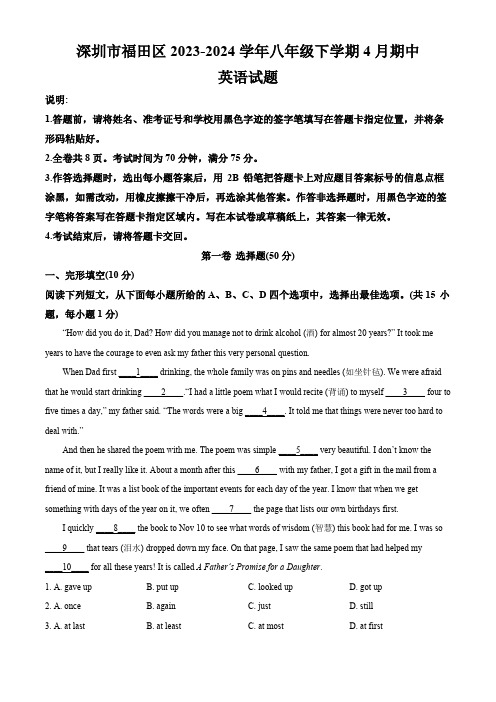
深圳市福田区2023-2024学年八年级下学期4月期中英语试题说明:1.答题前,请将姓名、准考证号和学校用黑色字迹的签字笔填写在答题卡指定位置,并将条形码粘贴好。
2.全卷共8页。
考试时间为70分钟,满分75分。
3.作答选择题时,选出每小题答案后,用2B 铅笔把答题卡上对应题目答案标号的信息点框涂黑,如需改动,用橡皮擦擦干净后,再选涂其他答案。
作答非选择题时,用黑色字迹的签字笔将答案写在答题卡指定区域内。
写在本试卷或草稿纸上,其答案一律无效。
4.考试结束后,请将答题卡交回。
第一卷选择题(50分)一、完形填空(10分)阅读下列短文,从下面每小题所给的A、B、C、D四个选项中,选择出最佳选项。
(共15 小题,每小题1分)“How did you do it, Dad? How did you manage not to drink alcohol (酒) for almost 20 years?” It took me years to have the courage to even ask my father this very personal question.When Dad first ____1____ drinking, the whole family was on pins and needles (如坐针毡). We were afraid that he would start drinking ____2____.“I had a little poem what I would recite (背诵) to myself ____3____ four to five times a day,” my father said. “The words were a big ____4____. It told me that things were never too hard to deal with.”And then he shared the poem with me. The poem was simple ____5____ very beautiful. I don’t know the name of it, but I really like it. About a month after this ____6____ with my father, I got a gift in the mail from a friend of mine. It was a list book of the important events for each day of the year. I know that when we get something with days of the year on it, we often ____7____ the page that lists our own birthdays first.I quickly ____8____ the book to Nov 10 to see what words of wisdom (智慧) this book had for me. I was so ____9____ that tears (泪水) dropped down my face. On that page, I saw the same poem that had helped my____10____ for all these years! It is called A Father’s Promise for a Daughter.1. A. gave up B. put up C. looked up D. got up2. A. once B. again C. just D. still3. A. at last B. at least C. at most D. at first4. A. help B. story C. joke D. mountain5. A. or B. but C. so D. if6. A. fight B. meal C. match D. talk7. A. turn out B. turn on C. turn to D. turn up8. A. started B. sold C. sent D. opened9. A. sad B. angry C. touched D. sorry10. A. friend B. family C. mother D. father二、阅读理解(40分)第一节阅读下列短文,从下面每小题所给的A、B、C、D四个选项中,选择出最佳选项。
深圳福田区实验学校中学部八年级下期中英语试卷(无听力部分,无答案)-教学文档

2019-2019深圳福田区实验学校中学部八年级下期中英语试卷第II卷笔试部分客观题(55%)I词汇测试(7.5% )i.根据句意,选择与划线部分意思最近的选项。
(共8小题,每小题0.5分)16. This novel is famous and it is welcomed by teenagers.A. people between 13 and 19 years oldB. students aged over 18C. children under 12 years old17. —Her expression shows that she didn't pass her English test again.—Let's raise her spirits.A. make her have abilityB. make her have courageC. make her relaxed18. Are you sure that it won't rain tomorrow?A. certainB. sadC. excited19. If you want to have a meal in the restaurant, you must be well-dressed.A. taking enough moneyB. dressing up as a famous personC. wearing nice clothes20. If you want to keep fit, you must do your best to do more sports.A. comfortableB. beautifulC. healthy21. —What do you think of Mrs. Brown?— She is not rich, but she keeps helping others all the time.A. on the wayB. all the wayC. in the way22. She is sure that she will make it on her career one day.A. become successfulB. lose heartC. be defeated23. My friends went on the cinemas separately to watch the same film.A. went to the cinema by themselvesB. didn't go to the. cinema togetherC. went to the cinema secretlyii从下面每小题的A、B、C三个选项中选出最佳答案。
广东省深圳市2022-2023学年八年级下学期期中英语试卷(含答案)
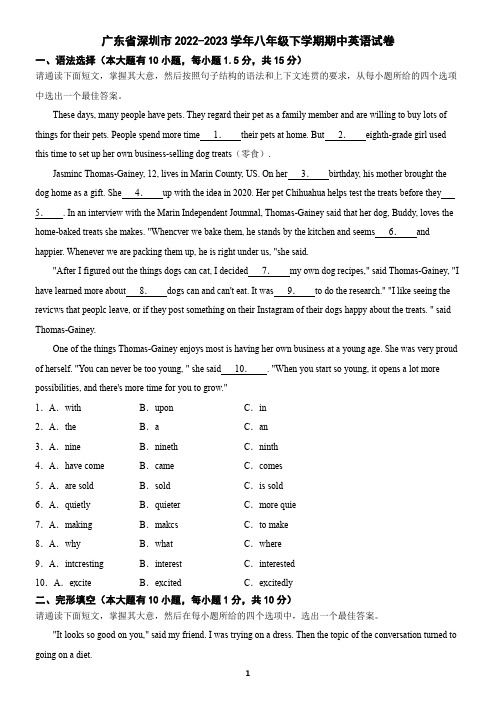
广东省深圳市2022-2023学年八年级下学期期中英语试卷一、语法选择(本大题有10小题,每小题1.5分,共15分)请通读下面短文,掌握其大意,然后按照句子结构的语法和上下文连贯的要求,从每小题所给的四个选项中选出一个最佳答案。
These days, many people have pets. They regard their pet as a family member and are willing to buy lots of things for their pets. People spend more time 1.their pets at home. But 2.eighth-grade girl used this time to set up her own business-selling dog treats(零食).Jasminc Thomas-Gainey, 12, lives in Marin County, US. On her 3.birthday, his mother brought the dog home as a gift. She 4.up with the idea in 2020. Her pet Chihuahua helps test the treats before they 5.. In an interview with the Marin Independent Joumnal, Thomas-Gainey said that her dog, Buddy, loves the home-baked treats she makes. "Whencver we bake them, he stands by the kitchen and seems 6.and happier. Whenever we are packing them up, he is right under us, "she said."After I figured out the things dogs can cat, I decided 7.my own dog recipes," said Thomas-Gainey, "I have learned more about 8.dogs can and can't eat. It was 9.to do the research." "I like seeing the revicws that peoplc leave, or if they post something on their Instagram of their dogs happy about the treats. " said Thomas-Gainey.One of the things Thomas-Gainey enjoys most is having her own business at a young age. She was very proud of herself. "You can never be too young, " she said 10.. "When you start so young, it opens a lot more possibilities, and there's more time for you to grow."1.A.with B.upon C.in2.A.the B.a C.an3.A.nine B.nineth C.ninth4.A.have come B.came C.comes5.A.are sold B.sold C.is sold6.A.quietly B.quieter C.more quie7.A.making B.makcs C.to make8.A.why B.what C.where9.A.intcresting B.interest C.interested10.A.excite B.excited C.excitedly二、完形填空(本大题有10小题,每小题1分,共10分)请通读下面短文,掌握其大意,然后在每小题所给的四个选项中,选出一个最佳答案。
广东省专版 深圳市八年级(下)期中英语试卷 附答案
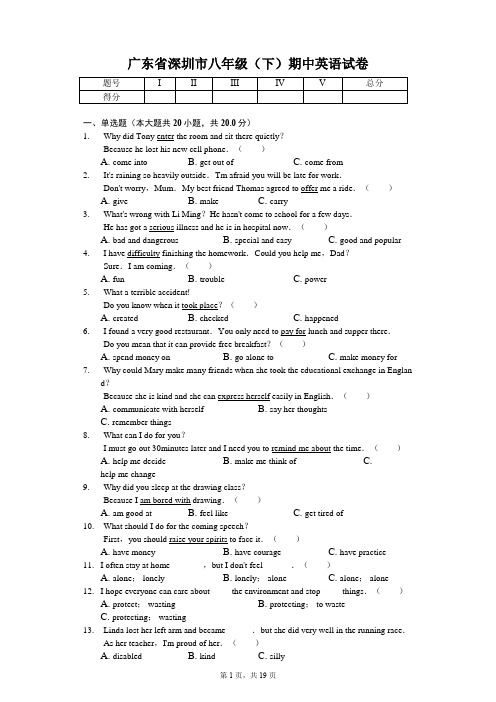
广东省深圳市八年级(下)期中英语试卷一、单选题(本大题共20小题,共20.0分)1.-Why did Tony enter the room and sit there quietly?-Because he lost his new cell phone.()A. come intoB. get out ofC. come from2.-It's raining so heavily outside.Tm afraid you will be late for work.-Don't worry,Mum.My best friend Thomas agreed to offer me a ride.()A. giveB. makeC. carry3.-What's wrong with Li Ming?He hasn't come to school for a few days.-He has got a serious illness and he is in hospital now.()A. bad and dangerousB. special and easyC. good and popular4.-I have difficulty finishing the homework.Could you help me,Dad?-Sure.I am coming.()A. funB. troubleC. power5.-What a terrible accident!-Do you know when it took place?()A. createdB. checkedC. happened6.-I found a very good restaurant.You only need to pay for lunch and supper there.-Do you mean that it can provide free breakfast?()A. spend money onB. go alone toC. make money for7.-Why could Mary make many friends when she took the educational exchange in England?-Because she is kind and she can express herself easily in English.()A. communicate with herselfB. say her thoughtsC. remember things8.-What can I do for you?-I must go out 30minutes later and I need you to remind me about the time.()A. help me decideB. make me think ofC.help me change9.-Why did you sleep at the drawing class?-Because I am bored with drawing.()A. am good atB. feel likeC. get tired of10.-What should I do for the coming speech?-First,you should raise your spirits to face it.()A. have moneyB. have courageC. have practice11.I often stay at home _______,but I don't feel ______.()A. alone; lonelyB. lonely; aloneC. alone; alone12.I hope everyone can care about ____ the environment and stop ____ things.()A. protect; wastingB. protecting; to wasteC. protecting; wasting13.-Linda lost her left arm and became______.but she did very well in the running race.-As her teacher,I'm proud of her.()A. disabledB. kindC. silly14.Do you know _________ there?()A. when goingB. when to goC. how go15.Don't let the dog _______ into the room,please.()A. to comeB. comeC. coming16.My parents often tell me ________ in the street.()A. not runB. not runningC. not to run17.Some disabled children have difficulty __________.()A. walkB. walkingC. to walk18.-Linda lost her left arm and became disabled.but she did very well in the ______ race.-As her teacher,I'm proud of her.()A. runB. to runC. running19.A(n)_______is a look on a person's face that shows his/her thoughts or feelings.()A. impressionB. expressionC. message20.Please remind me _____ my sister's birthday present.()A. forB. onC. about二、完形填空(本大题共10小题,共15.0分)An old woman became blind in an accident.So she called a doctor and promised that if he could make her(21) again,she would give a lot of money to him;but if the doctor didn't (22),he would get nothing.The doctor agreed.After some time,he used his medicine to cure her eyes,and on every (23) he took something away.At last,he (24) all the old woman's money little by little.When he made her eyes well again,the doctor asked for the promised (25).However,the old woman saw (26) in her house.She didn't (27) to give him anything.The doctor took her to the judge (法官):The woman shouted,"What he says is (28),for I did promise to give him some money if I could see again.But if I continued to be (29),he would get nothing.I could see many kinds of (30)things in my house before I became blind.Now I am not able to see anything in it."21. A. hear B. see C. watch22. A. operate B. succeed C. appear23. A. trip B. holiday C. visit24. A. pushed B. broke C. stole25. A. payment B. wish C. time26. A. something B. nothing C. everything27. A. want B. promise C. forget28. A. foolish B. important C. true29. A. poor B. blind C. quiet30. A. famous B. valuable C. bad.三、阅读理解(本大题共20小题,共30.0分)APeople eat different things in different parts of the world.In south China we eat rice every day.Sometimes we eat it two or three times a day,for breakfast,lunch and supper.We usually eat it with fish,meat and vegetable.The Japanese eat rice,too.They also eat a lot of fish.They sometimes eat raw(生的)fish.In Africa,maize(玉米)is the most important food.People there make maize into flour(面粉).From this flour they make different kinds of bread and cakes.In western(西方的)countries such as Britain,Australia and the U.S.A,the most important food is bread or potatoes.People there usually make their bread from wheat flour.They cook the potatoes in different ways.In England the most popular food is fish and chips.Sometimes people cook this food at home,but usually they buy it at the shop.They eat this food at home,in their work place,in the park or on the road.People call it"take-away"food.31.This passage is about ______ .A. foodB. drinkC. clothesD. ways of life32.Who sometimes eat fish when it isn't cooked?______A. People in ChinaB. People in JapanC. People in AfricaD. People in Britain33.The most important food for African people is ______ .A. riceB. fishC. vegetableD. maize34.Which of the following countries is called"a western country"?______A. One of the countries in AfricaB. JapanC. ChinaD. Australia35.People eat"take-away"food ______ .A. at homeB. on their way to schoolC. in their officesD. A、B and C.BOne day the workers of a company saw a notice on the door.It said,"Yesterday the person who stopped you from being better in this company died.We invite you to attend the funeral (葬礼)in the room that has been prepared in the gym."At first everyone was sad to hear that one of the workers had died,but after a while they started getting curious (好奇的)about who this person might be.The excitement grew as the workers arrived at the gym to pay their last respect.Everyone wondered,"who is this person that was stopping my progress?Well,at least he's no longer here!"One by one the workers got closer to the coffin (棺材)and when they looked inside it they suddenly became speechless.They stood near the coffin and amazed without a word.There was a mirror inside the coffin,and everyone who looked inside it could seehimself/herself.There were some words next to the mirror-There is only one person who can stop you from being better:it is you.You are the only person who can change your life.Your life doesn't change when your friends and parents change or when your company changes.Your life changes when you change,when you realize that you are the only one responsible (有责任的)for your life.36.Where was the funeral held?______A. In a gym.B. In a hospital.C. In a restaurant.D. In a hotel.37.Which shows the right changes of the workers'feelings to the person'death?______A. Sad→excited→curious→speechless→amazed.B. Sad→amazed→excited→speechless→curious.C. Sad→curious→excited→amazed→speechless.D. Sad→curious→excited→speechless→amazed.38.Who is the person that stops you from being better according to the passage?______A. Your parents.B. Your friends.C. Your company.D. Yourself.39.Which is TRUE according to the passage?______A. The workers saw a notice on the wall.B. There was nothing in the coffin.C. In fact,nobody in the company died.D. The funeral was held by the dead person's family.40.What does the passage mainly talk about?______A. We should respect all people around us.B. Working for a good company can change our life.C. The person who stops your development is yourself.D. We should try our best to keep us in good health.CVoluntary work can be a very helpful experience.It can help people build self-confidence (自and improve their communication skills Here are several kinds of voluntary work?A. Voluntary work.B. An experience.C. Building self-confidence.D. Improving their skills.42.What does the underlined word"beneficial"mean?______A. Boring.B. Helpful.C. Unhealthy.D. Useless.43.Which kind of voluntary work will be liked by both teenagers and grown-ups?______A. Nursing Homes.B. Early Childhood.C. Hospitals.D. Libraries.44.Which is NOT part of the voluntary work in hospitals according to the passage?______A. Sending newspapers.B. Making dinner.C. Spending time with patients.D. Sending presents.45.What are the above ads mainly about?______A. Some kind people.B. The ways to do voluntary work.C. Some kinds of voluntary work.D. The best time to do voluntary work.DA new study found that people's lives are made shorter in North China.It showed the life expectancy (平均寿命)had been cut down by 5.5years there.Scientists think that it is because of the heavy air pollution.It is really the truth (实情).Our government (政府)has already done something.However,it doesn't seem to work so well."Air pollution is bad for people's health.The harm is much more serious than we can imagine,said Chen Yuyu of Peking University,one scientist of this study.There was serious smog and haze in Beijing in the first days of December in 2015.The sky was gray and the air smelt strange.Heavy haze covered the city.Highways were closed and flights couldn't take off on time.People couldn't see things clearly even within 15meters in some places.Some primary schools were closed for several days.We should all fight against air pollution and think of good ways to solve the problem.People should be encouraged to take buses,ride bicycles or walk instead of driving cars.The factories that pollute air heavily should be closed."We need to improve our environment,although it might be expensive.Protecting our environment means protecting ourselves,"Li Hongbin,another scientist,said.46.Why do peopled lives-become shorter in North China according to the scientists?______A. Because the air is heavily polluted.B. Because it's too cold in winter there.C. Because there are too many cars there.D. Because it's too dry all year long.47.What's the function (功能)of the third paragraph?______A. To show different ideas of the scientists.B. To use an example to show the serious air pollution.C. To show what we should do to protect the environment.D. To give us some advice on living in Beijing.48.Which of the following is Li Hongbin's idea?______A. The life expectancy had been cut down by 5.5years.B. We should close the factories that pollute air heavily.C. People need to make pollution less,although it might cost a lot.D. Tie air pollution brings us serious problems.49.The passage may come from a(n)______ .A. noticeB. advertisementC. reportD. diary50.What's the main idea of the passage?______A. Air pollution in North China is caused by waste gas.B. To save the environment,we should do something more.C. The temperature becomes higher and higher in North China.D. How air pollution in China happened.四、阅读填空(本大题共1小题,共10.0分)51.Table manners (礼仪)show respect to others.So,following some basic (基本的)table manners (51)______(be)important.You(52)______(invite)to have dinner.When the host says,"Please take your seat",you may think,"Which seat?"At a Chinese-style dinner,the host (53)______(take)the seat facing the door.And the seat on his left is for (54)______(important)visitor.Many Chinese people look dinners as perfect chances for conversations.(55)______,westerners don't always like talking at the table.Remember not (56)______(talk)with your mouth full.While someone is talking,you should look into his or her eyes and listen (57)______(careful).Safe conversation subjects include food,the day's activities and weather."I can't stand (忍受)people who talk loudly into their phones,"people oftencomplain.We're tired of (58)______(listen)to loud conversations every day.When you are at dinner,it's best to keep your phone (59)______(quietly).If necessary,just send (60)______ text message.五、书面表达(本大题共1小题,共10.0分)52.去年暑假,你和你的父母去河源的一所乡村小学做了一些义务工作.请根据下面提示,介绍一下你们做了哪些事情,并且得到了哪些收获.要求:80词左右,可以适当发挥.提示:1.我购买了故事书给那里的学生;2.父母给了学校一笔钱用于帮助失学儿童;3.认识了新的朋友小明,并且每天帮助他做家务;4.每天晚上帮助小明学习数学;你对这次义务活动的感受.答案和解析1.【答案】A【解析】答案:AA 进入;B 出去;C 来自于.根据句意"Tony为什么进房间后静静地坐在那儿?"可知,"enter"意为"进入",故答案为A--Tony为什么进房间后静静地坐在那儿?--因为他丢了他的新手机.这道题考查的是同义词、近义词的辨析,要根据句意判断出划线词语的意思,然后根据选项选出正确答案.2.【答案】A【解析】答案:A offer sb.a ride载某人一程,意思相当于give sb.a ride,故选A.B使,制造;C搬动.句意:外面雨下得很大,恐怕你上班要迟到了.别担心,妈妈,我最好的朋友托马斯答应送我一程.offer sb.a ride载某人一程,意思相当于give sb.a ride3.【答案】A【解析】答案:Aserious严重的,结合后文He is in hospital now.他现在在医院.推测病得较重,结合选项,A糟糕的,危险的,意思与之相近,故选A.B特殊的,容易的;C好的,流行的.句意:李明怎么了?他已经几天没来学校了.他病得很重,现在住院了.上下文语境是解题的关键.4.【答案】B【解析】答案:B 本题考查固定短语have difficulty (in)doing sth.做某事有困难,意思相当于have trouble (in)doing sth.故选B.A乐趣;C能量.句意:我有困难完成家庭作业,你能帮我吗,爸爸?当然,我来了.固定短语have difficulty (in)doing sth.做某事有困难,意思相当于have trouble (in)doing sth.5.【答案】C【解析】答案C take place发生,过去时为took place,意思与C发生相近,故答案是C.它们都没有被动形式.A创造;B检查.句意:多么可怕的事故!你知道什么时候发生的吗?take place与happen都表示发生,没有被动语态.6.【答案】A【解析】答案:A pay for为…付账,人作主语,意思与A,spend money on花钱在…,也是人作主语,故答案是A.B单独去;C为…赚钱.句意:我找到了一家很好的餐馆,你只需付午餐和晚餐就可以了.你的意思是它可以提供免费早餐吗?要注意区分:pay (for)/spend/cost/take的意义和用法.7.【答案】B【解析】答案:B express herself表达她自己,意思与B说出她的想法一致,故答案是B.A与她自己交流;C记住事情.句意:为什么玛丽在英国接受教育交流时会交到许多朋友?因为她善良,她能用英语轻松表达自己.上下文语境有助于我们解题.8.【答案】B【解析】答案:B remind me about the time提醒我时间,意思与B项使我想起时间接近,故选B.remind sb.about sth提醒某人某事.A帮我决定;C帮我改变.句意:我能为你做点什么呢?我30分钟后必须出去,我需要你提醒我时间.remind sb.of sth.使某人想起某事.9.【答案】C【解析】答案:C 本题考察固定短语be bored with…厌恶/讨厌…,意思相当于C厌恶,讨厌,故答案是C.A擅长于;B感觉像.句意:你为什么在绘画课睡觉?因为我讨厌绘画.be bored with…厌恶/讨厌…,意思相当于get tired of…10.【答案】B【解析】答案:B raise your spirits意思是:提高你的精神,结合选项,意思与B项(有勇气)吻合,故选B.A项有钱;C项有实践.句意:我该为即将到来的演讲做些什么?首先,你应该提高你的精神面对它.raise的意思较多,常见的有提高;筹集;饲养等,要掌握.11.【答案】A【解析】答案:A,考查副词的词义辨析.句意"我经常一个人在家,但是我不感觉到孤独."alone 独自,一个人,强调只有某人自己;lonely孤独的,表示内心的感受.根据题干I often stay at home _______,but I don't feel ______.可知我经常一个人在家,但是我不感觉到孤独.故选A.我经常一个人在家,但是我不感觉到孤独.能够理解alone和lonely词义和用法,根据具体内容作答.12.【答案】C【解析】正确答案:C.care about表示关心、在乎,其后可跟动名词,则第一空应填写protecting.其次stop doing sth.表示停止做某事,stop to do sth.表示停下一件事情去做另一件事,句中指停止浪费,则第二空应填写wasting,故选择C.我希望每个人都可以爱护环境,停止浪费.本题考查动名词,基础题,熟悉后跟动名词的动词或动词短语即可作出选择.13.【答案】A【解析】答案:A,考查形容词词义辨析.句意"--琳达失去了她的胳臂变成残疾的.但是她在长跑比赛中跑的很好.--最为她的老师,我为她感动骄傲."disabled残疾的;kind和蔼的;silly愚蠢的.根据题干Linda lost her left arm 琳达失去了她的胳臂.应是变成残疾的.故选A.--琳达失去了她的胳臂变成残疾的.但是她在长跑比赛中跑的很好.--最为她的老师,我为她感动骄傲.理解各个选项的含义,根据具体内容作答.14.【答案】B【解析】答案:B.know后加"疑问词+动词不定式"结构做宾语,故答案是B.你知道什么时候去那里?我们可以用"疑问词+动词不定式"结构做动词的宾语.疑问词包括疑问代词 what、which、who和疑问副词how、when、where 等.但所有疑问词中,只有why不可以和动词不定式连用.15.【答案】B【解析】答案:B.本题考查非谓语动词的用法.根据语境推测句意是"请不要让狗进入房间."由于设空处前面的let判断考查句式let sb.do sth.,故选B请不要让狗进入房间.本题考查非谓语动词的用法,抓住句中的关键词并联系相关的语法知识可得出正确的答案.平时注意对此类短语或句式用法的总结与归纳.16.【答案】C【解析】答案:C.本题考查非谓语动词的用法.根据语境推测句意是"我的父母经常吩咐我不要在街上跑.".由设空处前面的tell判断此题考查句式"tell sb.(not)to do sth.吩咐某人(不要)做某事";所以选C.我的父母经常吩咐我不要在街上跑.本题考查非谓语动词的用法,抓住句中的关键词并联系相关的语法知识可得出正确的答案.平时注意对此类短语或句式用法的总结与归纳.17.【答案】B【解析】正确答案:B.have difficulty (in)doing sth.表示做某事有困难,故选择B.一些残疾的小孩走路有困难.本题考查动名词,基础题,熟记后可跟动名词的常用的动词或短语.18.【答案】C【解析】正确答案:C.根据题干可知虽然琳达残疾了,但是她在赛跑中表现很棒,赛跑是running race,现在分词running作定语修饰race,故选择C.do well in sth.表示擅长某事,be pround of表示为…感到骄傲.-琳达失去了她的左胳膊,变残疾了,但是在赛跑中她表现得非常好.-作为她的老师,我为她感到骄傲.本题考查现在分词,基础题,掌握其基本用法即可作出选择.19.【答案】B【解析】答案:B,考查名词词义辨析.句意"表情是一个人脸上表现出来的想法或感受."impression印象;expression表情;message消息.根据题干A(n)_______isa look on a person's face that shows his/her thoughts or feelings.可知应为表情是一个人脸上表现出来的想法或感受.故选B.表情是一个人脸上表现出来的想法或感受.理解各个选项的含义,根据具体内容作答.20.【答案】C【解析】答案:C.考查介词.句意"请提醒我关于我妹妹的生日礼物".for为了.on 在…上.about关于.remind sb about sth提醒某人关于某事.答案是C.请提醒我关于我妹妹的生日礼物.考查介词用法,这个知识点很广泛,有一些固定用法,需要日常积累,结合语境选择正确介词完成习题.21.【答案】【小题1】B 【小题2】B 【小题3】C 【小题4】C 【小题5】A【小题6】B 【小题7】A 【小题8】C 【小题9】B 【小题10】B【解析】21.答案:B.考查动词及语境的理解,hear听见,see看见,watch观看,根据上文An old woman became blind in an accident.可知这里指:如果医生能让她重见光明,她会给她很多钱.故选:B.22.答案:B.考查动词及语境的理解,operate操作,succeed成功,appear出现,根据上文So she called a doctor and promised that if he could make her see again,she would give a lot of money to him.可以推断出这里指:如果治不好眼睛的话(指如果不成功的话),他什么也得不到.故选:B.23.答案:C.考查名词及语境的理解,trip旅行,holiday假期,visit来访,根据上文After some time,he used his medicine to cure her eyes.结合下文可知这里指:每次来给她看病,他会拿走一些东西.故选:C.24.答案:C.考查动词及语境的理解,push推,break断裂,steal偷窃,根据上文After some time,he used his medicine to cure her eyes,and on every visit he took something away.可以推断出这里指:最后,他渐渐偷光老太太所有的钱.故选:C.25.答案:A.考查名词及语境的理解,payment支付的金额,wish希望,time时间,根据上文So she called a doctor and promised that if he could make hersee again,she would give a lot of money to him.可知这里指:当他再次使她的眼睛好起来时,医生要求他答应付款.故选:A.26.答案:B.考查不定代词及语境的理解,something某物,nothing什么也没有,everything所有东西,一切,根据上文At last,he stole all the old woman's money little by little.可知:老太太看见她家里什么东西也没有.故选:B.27.答案:A.考查动词及语境的理解,want想要,promise承诺,forget忘记,根据上文可知老太太老太太看见她家里什么东西也没有.由此可以推断出:她不想给任何东西.故选:A.28.答案:C.考查形容词及语境的理解,foolish愚蠢的,important重要的,true 正确的,根据下文for I did promise to give him some money if I could see again.可知:因为我答应给他一些钱,如果我能重见光明.由此可知:这位医生说的话是真的.故选:C.29.答案:B.考查形容词及语境的理解,poor穷的,blind失明的,quiet安静的,根据上文for I did promise to give him some money if I could see again.可以推断出这里指:但是如果我继续瞎了,他什么也得不到.故选:B.30.答案:B.考查形容词及语境的理解,famous著名的,valuable有价值的,bad坏的,结合句意:在我失明之前,我能在家里看到许多贵重的东西,现在我什么也看不见.故选:B.这篇短文介绍了一位老太太承诺医生如果治好她的眼睛,她会给他很多钱.结果,这位医生每次来给她看病时,他会拿走一些东西,最后偷光老太太所有的钱.当老太太重见光明时,他向她索要付款,结果老太太没有支付能力.医生只好把她交给法官.老太太承认医生说的话是真的,但是在我失明之前,我能在家里看到许多贵重的东西,现在我什么也看不见.完型填空题的作答需先通读全文,抓住文章大意,运用语法知识,填写正确的词语形态.31.【答案】【小题1】A 【小题2】B 【小题3】D 【小题4】D 【小题5】D 【解析】31.A.主旨题.结合第一句People eat different things in different parts of the world.可知本文说的是各地的食物,故选A.32.B.细节题,结合第三段The Japanese eat rice,too.They also eat a lot of fish.They sometimes eat raw(生的)fish可知日本人吃生鱼片,故选B.33.D.细节题,结合第三段In Africa,maize(玉米)is the most important food.可知非洲最重要的是玉米.34.D.细节题,结合第四段In western(西方的)countries such as Britain,Australia and the U.S.A可知澳大利亚是西方国家,故选D.35.D.细节题,结合最后They eat this food at home,in their work place,in the park or on the road.People call it"take-away"food.可知在家里,工作的地方,公园,路上都行,故选D.这篇文章讲述了世界不同地方的人有着不同的饮食,中国南方人吃大米,日本人吃生鱼片,非洲人吃榆木,西方国家的人喜欢吃面包和土豆.英国人喜欢吃鱼和薯条,被称为快餐.首先要仔细阅读短文,掌握大意,然后结合具体的题目,再读短文找出相关的信息,就可以确定正确答案36.【答案】【小题1】A 【小题2】C 【小题3】D 【小题4】C 【小题5】C【解析】36、A.细节题.结合 We invite you to attend the funeral (葬礼) in the room that has been prepared in the gym可知是在体育馆举行葬礼,故答案是A.37、C.细节题.结合At first everyone was sad to hear that one of the workers had died,but after a while they started getting curious (好奇的)about who this person might be一开始伤心,之后好奇,The excitement grew as the workers arrived at the gym to pay their last respect兴奋,when they looked inside it they suddenly became speechless.They stood near thecoffin and amazed without a word惊讶无语.故答案是C.38、D.细节题.结合There is only one person who can stop you from being better:it is you.可知是自己能阻止自己更好,故答案是D.39、C.细节题.结合There was a mirror inside the coffin可知没人去世,故答案是C.40、C.主旨题.结合There is only one person who can stop you from being better:it is you.可知是自己阻止了自己的进步,故答案是C.一个公司,有人去世,邀请员工参加葬礼,知道他们的一个同事去世后,一开始大家都很伤心.又对谁死了感到好奇,等到他们看到棺材,棺材里放置的是一面镜子,极其吃惊,这出乎他们的意料,文章告诉我们,我们之所以在成长进步中受到阻碍,是因为我们自己给自己设限了,所以我们要想改变这一切,就必须越过自己.仔细阅读后面的题目要求,在原文找出问题题干所包括的信息部分,这样就可以快速准确地抓住有效信息,确保答题的准确性.如果是根据英文释义写单词的题,则一定要确保所填的单词来源于原文,切不可脱离原文,随意发挥.41.【答案】【小题1】A 【小题2】B 【小题3】B 【小题4】B 【小题5】C【解析】41.答案:A.语义猜测题,根据Voluntary work can be a very helpfulexperience.可知:志愿者工作可以是一种很有用的经历.下文It can help people build self-confidence (自信)and improve their communication skills.可知:它能帮助人们建立自信,提高交际能力.这里介绍志愿者工作的好处,It代替Voluntary work,故选:A.42.答案:B.词义猜测题,根据上文Volunteering at nursing homes not only helps the volunteer improve himself/herself,but also is good for the people of the home.Volunteers can help people of the home cut their hair or play games with them,or volunteers just visit the people there.可知:在疗养院做义工不仅有助于提升自己,而且对疗养院里的人有好处.志愿者可以帮助他们理发或玩游戏,或者志愿者只是看望那里的人.可以推断出这些活动对疗养院里的人有帮助.由此猜测出:beneficial意思为helpful;故选:B.43.答案:B.细节理解题,根据Early Childhood:Both grown-ups and teenagerscan enjoy this kind of voluntary job.可知:成年人和青少年会喜欢幼儿园.故选:B.44.答案:B.细节理解题,根据In hospitals,volunteers may help patients and send newspapers and presents.Volunteers also spend time with patients making their hospital stay a little easier.可知:志愿者可以帮助病人送报和礼物,花时间让他们呆在医院更容易些.故选:B.45.答案:C.主旨大意题,根据表格中标题名称:Nursing Homes;EarlyChildhood;Hospital;Libraries可知这里介绍了几种类型的志愿者工作.故选:C.志愿者工作是一种很有益的经历,它可以帮助人们建立自信,提高交际能力.文中重点介绍了几种类型的志愿者工作.首先通读全文,了解文章大意,然后弄清题干意思,对照短文信息确定正确答案.46.【答案】【小题1】A 【小题2】B 【小题3】C 【小题4】C 【小题5】B【解析】46、A.细节题.结合第一段Scientists think that it is because of the heavy air pollution.可知是因为空气污染严重,故选A.47、B.推理题.结合第三段第一句There was serious smog and haze in Beijing in the first days of December in 2015.是说北京的一次严重的雾霾,用此来举例严重的空气污染,故选B.48.C:细节理解题.根据We need to improve our environment,although it might be expensive.Protecting our environment means protecting ourselves,"Li Hongbin,可知李宏斌认为要改善环境,减少污染,虽然可能要花很多钱.故选C.49.C:推理判断题.根据A recently study found people's lives are made shorter in North China.可知最近的研究发现在中国北方人们的平均寿命减少了.这是关于日常生活的研究,故推测这篇文章摘自一篇报道.故选C.50.B:概括归纳题.根据Air pollution in China is doing harm to people's health.和Chinese government should strongly fight against air pollution.可知本文主要讲空气污染对人们的健康有害,中国政府应该强烈对抗空气污染,为改善环境采取更多的措施.故选B.本文叙述了最近的研究发现在中国北方由于空气污染,人们的平均寿命减少了5.5岁.空气污染主要是由煤燃烧产生的废气导致的.研究人员认为,空气污染对人们的健康有害,中国政府应该强烈对抗空气污染,为改善环境采取更多的措施.本文有一定的难度,文章稍长,出现了一些生词需要自己结合文章来理解,本文的问题大部分是细节理解题,可以直接从文中找出,剩下的是主旨大意题只要理解文章意思也可轻松解答.51.【答案】【小题1】is【小题2】are invited【小题3】takes【小题4】the most important【小题5】However【小题6】to talk【小题7】carefully【小题8】listening【小题9】quiet【小题10】a【解析】51、is 考查动词,根据following some basic (基本的)table manners,可知是动名词作主语,所以动词用三单式,时态为一般现在时,故填is.52、are invited 考查动词,根据句意"你被邀请去吃晚饭",可知是被动语态be+过去分词,时态为一般现在时,故填are invited.53、takes 考查动词,根据主语是三单式the host,时态为一般现在时,故填takes.54、the most important 考查形容词,根据句意"左边的座位留给最重要的客人",可知此处用形容词最高级,最高级前要加the,故填the most important.55、However 考查连词,根据westerners don't always like talking at the table,可知这跟前文是转折关系,用逗号隔开,不能用but,故填However.56、to talk 考查动词,根据with your mouth full,可知是指不要满嘴食物说话,结合Remember not,可知是句型remember not to do sth记得不要做某事,故填to talk.57、carefully 考查副词,根据listen,可知用副词修饰动词listen,故填carefully.58、listening 考查动词,根据of,可知介词后用动名词,故填listening.59、quiet 考查形容词,根据keep your phone,可知考查句型keep sb/sth+形容词,是某人或某物保持…,故填quiet.60、a 考查冠词,根据句意"如果必要,发送一个文字信息就够了",可知此处表示泛指,text发音以辅音音素开头,故填a.文章讲述了餐桌礼仪是对别人的尊重,并介绍了不同情况下的餐桌礼仪问题.灵活运用语法知识,如单词词性、时态、名词单复数、代词、冠词、等判断空白处应该填写的内容.52.【答案】Last summer vacation,I went to a country elementary school in Heyuan to do some voluntary work with my parents.We bought some story books for the students there【高分句型一,注意buy …for的使用】【要点一,我购买了故事书给那里的学生】.My parents gave the school some money to help the children out of school【要点二,父母给了学校一笔钱用于帮助失学儿童】.I met my new friend Xiao Ming and helped him with the housework every day【要点三,认识了新的朋友小明,并且每天帮助他做家务】,he isn't good at math,I help him to study math every night.【要点四,每天晚上帮助小明学习数学】I think this volunteer activity is very meaningful.【高分句型二,注意宾语从句的使用】【要点五,感受】【解析】高分句型一We bought some story books for the students there.我们购买了故事书给那里的学生.buy …for为…买东西.高分句型二I think this volunteer activity is very meaningful.我认为这次志愿者活动很有意义.这是一个宾语从句,I think是主句,后面的是宾语从句.动笔前应先认真阅读材料,围绕所给材料组织内容,确定主要短语,句式等问题.注意不要遗漏要点,句子要通顺连贯,没有语法错误.。
8下英语-实验学校中学部-期中试卷+答案
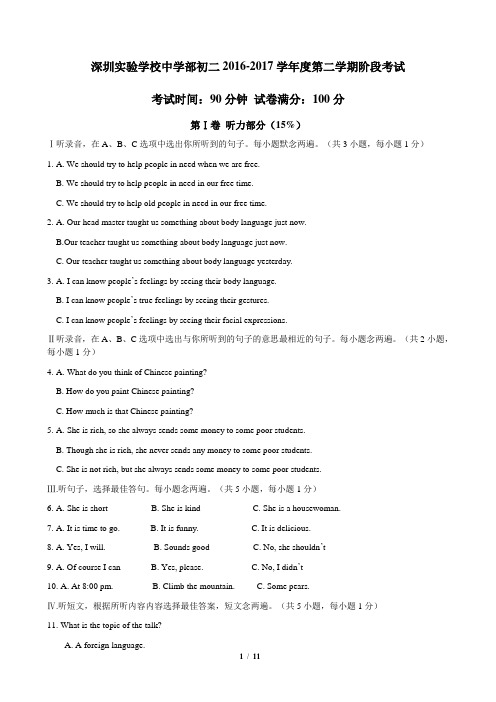
深圳实验学校中学部初二2016-2017学年度第二学期阶段考试考试时间:90分钟试卷满分:100分第Ⅰ卷听力部分(15%)Ⅰ听录音,在A、B、C选项中选出你所听到的句子。
每小题默念两遍。
(共3小题,每小题1分)1. A. We should try to help people in need when we are free.B. We should try to help people in need in our free time.C. We should try to help old people in need in our free time.2.A. Our head master taught us something about body language just now.B.Our teacher taught us something about body language just now.C. Our teacher taught us something about body language yesterday.3.A. I can know people’s feelings by seeing their body language.B. I can know people’s true feelings by seeing their gestures.C. I can know people’s feelings by seeing their facial expressions.Ⅱ听录音,在A、B、C选项中选出与你所听到的句子的意思最相近的句子。
每小题念两遍。
(共2小题,每小题1分)4.A. What do you think of Chinese painting?B. How do you paint Chinese painting?C. How much is that Chinese painting?5.A. She is rich, so she always sends some money to some poor students.B. Though she is rich, she never sends any money to some poor students.C. She is not rich, but she always sends some money to some poor students.Ⅲ.听句子,选择最佳答句。
广东省专版 深圳市中学八年级(下)期中英语试卷 附答案

广东省深圳市八年级(下)期中英语试卷一、单选题(本大题共15小题,共15.0分)1.The child stopped talking and ran towards me as soon as he saw me.()A. onB. ofC. to2.We have several important matters to deal with at the next meeting.()A. thingsB. questionsC. plans3.Sara appears to have many friends.()A. wants toB. seems toC. likes to4.You really play tennis well.I believe you will become a star in the future.()A. great trainerB. famous playerC. good learner5.I'm busy now.I will talk with you later.()A. before longB. next timeC. afterwards6.It is quite necessary for students to do eye exercises.()A. veryB. alwaysC. hardly7.Helen kept talking to the girl and tried to raise her spirits.()A. cheer her upB. let her downC. set her free8.Henry looked over and found there was a well-dressed woman.()A. woman who had much moneyB. woman who wore fashionable clothesC. woman who was very beautiful9.If you stay at home alone and have nothing to do,you may feel ________.()A. happyB. boredC. tired10. A ________ is a woman of good manners.()A. girlB. nurseC. lady11.Kelly works in a restaurant as a waitress in her spare time,so we can say shedoes a ________ job.()A. busyB. full-timeC. part-time12.In order to know what the weather is like tomorrow,you can listen to the ________.()A. weather forecastB. music radioC. daily news13.To ________ is to bring or collect something together.()A. holdB. raiseC. offer14.________ is the look on a person's face that shows feelings.()A. AppearanceB. ExpressionC. Impression15.When you want to learn a language,you should learn from the ________ words.()A. basicB. difficultC. large二、完形填空(本大题共10小题,共15.0分)The other day,I was getting into my car when I saw an old man walking up the hill.He looked tired,so I waited to see (16) he was OK.He was fine,so I (17)him where he came from.He said that he just (18) a train.He was almost blind,but I said he was (19).We spent the next thirty minutes(20) about his life.He told me he (21) the army during the Second World War.And I even found (22) had a connection through a family member!Welaughed so much that we almost cried.It cost me nothing other than thirty minutes of my(23).I learnt so much,and Albert enjoyed the talking and left smiling.I also had a(n)(24) to thank this great man for all he did to keep the country(25) during the war.Thanks,amazing Albert.You are an inspiration!16. A. if B. why C. but17. A. told B. asked C. kept18. A. got on B. drove away C. got off19. A. clever B. great C. lucky20. A. asking B. thinking C. talking21. A. joined B. held C. invited22. A. we B. they C. he23. A. money B. time C. afternoon24. A. friend B. plan C. opportunity25. A. clean B. happy C. safe.三、阅读理解(本大题共20小题,共30.0分)ATwo hunters rented(租用)a small plane to fly them to a forest.They told the pilot to come back and pick them up in about two weeks.By the end of the two weeks,they had hunted a lot of animals and they wanted to put all of them onto the plane.But the pilot said,"This plane can only take one lamb.You'll have to leave the others behind." Then one hunter said,"But last year,another pilot with the same plane let us take two lambs and some other animals onto the plane."So the new pilot thought about it.Finally he said,"OK,since you did it last year,I think this year we can do it again."Then they put all the animals they had hunted onto the plane,and the plane took off.Five minutes later,it crashed.The three men looked around,and one hunter asked the other one,"Where do you think we are now?"The other hunter looked around and said,"I think we're about one mile away from the place where the plane crashed last year."26.The two hunters stayed in the forest for ______ .A. one weekB. two weeksC. one yearD. two years27.What did the two hunters do in the forest?______A. They took a holiday in the forest.B. They learned how to fly a plane.C. They hunted a lot of animals.D. They found some lambs.28.What did the two hunters take onto the plane at last?______A. Nothing.B. One lamb.C. Two lambs.D. All the animals they hunted.29.This year,what happened to the plane at last?______A. It crashed.B. It didn't work.C. It landed on an island.D. It only flew one mile.30.What can we infer from the passage?______A. The two hunters knew the pilot before.B. The two hunters come to the forest every year.C. The new pilot didn't know the plane would crash at first.D. The plane the two hunters took last year also crashed after flying five minutes.BZach has a stepson,Bradley.One day,Zach drove over to meet Bradley.Bradley was a student in a high school.He neither liked nor disliked Zach,even though he had known Zach for three years.Zach was still trying to get along with Bradley.He told Bradley that he was coming over.Bradley said OK.When Zach got there,he asked if Bradley wanted to drive his car.Bradley had a driver's license.Bradley said all right.Zach told him not to drive too fast,but he could drive anywhere he wanted.Bradley got on the 210Road and headed northwest.Zach gave Bradley a few driving tips:Don't drive next to big cars;don't drive behind trucks with goods…On their way back,Zach suggested that they stop at the golf course(高尔夫球场).He wanted to show Bradley how to play golf.But Bradley didn't like it;he liked his video games.However,Bradley soon found that playing golf was fun and he did very well.The next day,Bradley,for the first time,called Zach.Bradley asked if Zach would come the next Saturday,so they could take a drive and go to the golf course again.Zach said yes,with a happy feeling in his heart.31.How did Bradley like his stepfather at first?______A. He liked him.B. He disliked him.C. He thought his stepfather was a good man.D. He neither liked nor disliked him.32.What does the underlined word"license"mean in Chinese?______A. 身份证.B. 执照.C. 护照.D. 银行卡.33.The reason why Zach tried to get along with Bradley is that ______ .A. he didn't know how to spend his timeB. he wanted to improve his relationship with BradleyC. he wanted to show what he could do well inD. he wanted to teach Bradley as a father34.The last sentence in the passage implies that ______ .A. Zach had never been happy beforeB. Zach was not easy to get along withC. Zach found hope in what he had doneD. Zach shared the same hobby with Bradley35.What's the main idea of the passage?______A. What Zach did in his spare time.B. How Zach got on well with his stepson.C. Zach taught Bradley how to play golf.D. Zach was good at driving and playing golf.CA smuggler(走私犯)drove to the border.When a soldier looked in the truck,he was surprised to find six big bags."What's in them?"the soldier asked."Dirt,"the smuggler answered."Take them out,"the soldier said."I want to check them."The smuggler opened the bags,and sure enough,each one of them was filled with dirt.So thesoldier let him go.A week later,the smuggler came back,and once again,the soldier looked in the truck."What's in the bags this time?"he asked."Dirt,more dirt,"said the smuggler.Not believing him,the soldier checked the bags and,once again,he found nothing but dirt.The same thing happened every week for six months,and the soldier finally became so frustrated(沮丧的)that he left and worked as a waiter in a restaurant.Then one night,the smuggler went to the restaurant and had a drink.The waiter saw him and said,"Listen!Drinks are free tonight if you tell me what you were smuggling all that time."Slowly,the smuggler got close to the waiter and said,"Trucks."36.The soldier found ______ bags in the smuggler's truck for the first time.A. fourB. fiveC. sixD. seven37.When the smuggler came again a week later,the soldier ______ .A. let him go without checkingB. invited him to a restaurantC. checked and found nothing but dirtD. left and became a waiter in a restaurant38.Why did the soldier feel frustrated?______A. Because he couldn't find what the smuggler smuggled.B. Because he wanted to become a smuggler.C. Because he wanted to work in a restaurant.D. Because his work was too boring.39.What did the smuggler smuggle all that time?______A. Dirt.B. Drinks.C. Trucks.D. Foods.40.Where is the passage probably taken from?______A. An advertising book.B. A poster.C. A fashion magazine.D. A joke book.DMy life plan is to visit all the states in the US.Several years ago,my husband and I were traveling in the northwest.One day,when we were having our breakfast,I lost my wallet that had over 300in it.There was no way for us to be able to find it,but we went on with our trip.We went off to drive around and enjoy the city,completely forgetting my missing wallet.Later on,when I checked my phone,there was a message from the boss of the restaurant where we had our breakfast:"I have something that belongs to you,and you're going to be very happy."We got back to the restaurant and there was the wallet on the table with all the money in it! The boss's son found the wallet in front of the door,and brought it to him.He thought that it must belong to someone who had a meal in the restaurant,so he checked inside and found my phone number on a piece of paper.41.Where were the writer and her husband when she lost her wallet?______A. They were in their hometown.B. They were in the southwest of the US.C. They were in the northeast of the US.D. They were in the northwest of the US.42.According to the passage,we can say that ______ .A. the writer always lost things during her tripsB. the message was a good surprise to the writerC. the wallet was not important for the writerD. the writer didn't mind that she had lost her wallet43.Which of the following is TRUE according to the passage?______A. The writer lost her way when she was looking for her wallet.B. The writer finally found her wallet under the table of the restaurant.C. It was in front of the restaurant's door that the wallet was found.D. The boss's son knew the writer's phone number and called her.44.What can we know from the passage?______A. The boss of the restaurant knew the writer before.B. The writer was thankful to the boss of the restaurant.C. The writer knew someone would bring back her wallet.D. The writer wasn't upset when she found that her wallet was missing.45.Which of the following words can describe the boss best?______A. Interesting.B. Nice.C. Hard-working.D. Stupid.四、阅读填空(本大题共1小题,共10.0分)46.One year ago,eleven of my friends and I got together and made a group.We called (28)______ (our)"12Caring Women".We meet once a (29)______ and take turns to hold the activity.We each donate(捐赠)20dollars,so we have 240dollars each month for (30)______ (do)good things.When we (31)______ (meet),we discuss what to do in the month.Last month,we donated the money to a (32)______ lady.She had a baby in an earthquake,but didn't have money (33)______ (raise)her baby.Over the past year,we have helped many people (34)______ need.We work with the government and (35)______ (school).They help us find people in need.If we don't have people to (36)______ in one month,we give the money to the nursing home (养老院).When we help people,we feel very happy.I'm writing this passage (37)______ (ask)more people to join us.五、完成句子(本大题共1小题,共4.0分)47.请用英语描述下图,要求六句话以上.______.六、书面表达(本大题共1小题,共15.0分)48.你知道"施比受更有福"的含义吗?"施"指"给予","受"指"接受","施比受更有福"意为"给予比接受更幸福".请根据下列提示,以"It Is More Blessed to Give than to Receive"为题,写一篇不少于80词的短文.内容提示:1.你的朋友小梅经常去养老院帮忙照顾老人;2.她帮助老人打扫房间、洗衣服、陪老人聊天、照顾生病的老人;3.你问她为什么这么做,她说:"施比受更有福."相关词汇:养老院 the nursing homeIt Is More Blessed to Give than to Receive.答案和解析1.【答案】C【解析】答案:CA 在…上;B…的;C 朝…方向.根据句意"他一看见我就停止谈话并跑向我"可知,"towards"意为"向…方向",故答案为C他一看见我就停止谈话并跑向我.这道题考查的是同义词、近义词的辨析,要根据句意判断出划线词语的意思,然后根据选项选出正确答案.2.【答案】A【解析】答案:AA 事情;B 问题;C 计划.根据句意"下个会议上我们有一些重要的事情要处理."可知,"matters"意为"事情",故答案为A下个会议上我们有一些重要的事情要处理.这道题考查的是同义词、近义词的辨析,要根据句意判断出划线词语的意思,然后根据选项选出正确答案.3.【答案】B【解析】答案:BA 想;B 好像;C 喜欢.根据句意"Sara好像有很多朋友."可知,"appears to"意为"好像",故答案为BSara好像有很多朋友.这道题考查的是同义词、近义词的辨析,要根据句意判断出划线词语的意思,然后根据选项选出正确答案.4.【答案】B【解析】答案:BA 好的教练;B 著名的运动员;C 好的学习者.根据句意"你网球真的打得很好,我相信你将来会成为一个明星的."可知,"star"在此处意为"著名的运动明星",故答案为B你网球真的打得很好,我相信你将来会成为一个明星的.这道题考查的是同义词、近义词的辨析,要根据句意判断出划线词语的意思,然后根据选项选出正确答案.5.【答案】C【解析】答案:CA 不久以后;B 下次;C 随后.根据句意"我非常忙,一会儿再跟你说."可知,"later"意为"一会儿后",故答案为C我非常忙,一会儿再跟你说.这道题考查的是同义词、近义词的辨析,要根据句意判断出划线词语的意思,然后根据选项选出正确答案.6.【答案】A【解析】答案:AA 非常;B 总是;C 几乎不.根据句意"学生做眼保健操非常必要."可知,"quite"意为"非常",故答案为A学生做眼保健操非常必要.这道题考查的是同义词、近义词的辨析,要根据句意判断出划线词语的意思,然后根据选项选出正确答案.7.【答案】A【解析】答案:AA 使她振奋;B 让她失望;C 让她自由.根据句意"Helen不停地跟这个女孩儿交谈,并尽力让她打起精神来."可知,"raise her spirits"意为"让她打起精神",故答案为AHelen不停地跟这个女孩儿交谈,并尽力让她打起精神来.这道题考查的是同义词、近义词的辨析,要根据句意判断出划线词语的意思,然后根据选项选出正确答案.8.【答案】B【解析】答案:BA 很有钱的女士;B 穿着时尚的女士;C 漂亮的女士.根据句意"Henry仔细查看了下,发现一个穿着时尚的女士."可知,"well-dressed woman"意为"穿着时尚的",故答案为BHenry仔细查看了下,发现了一位穿着时尚的女士.这道题考查的是同义词、近义词的辨析,要根据句意判断出划线词语的意思,然后根据选项选出正确答案.9.【答案】B【解析】答案:B,考查形容词词义辨析.句意"如果你待在家里而且没有事做,你可能感到无聊."happy高兴的,bored无聊的;tired疲劳的.根据前句If you stay at home alone and have nothing to do,如果你待在家里而且没有事做.可知是你可能感到无聊.故选B.如果你待在家里而且没有事做,你可能感到无聊.理解各个选项的含义,根据具体内容作答.10.【答案】C【解析】答案:C,考查名词词义辨析.句意"淑女是有良好举止的女人."girl女孩;nurse护士;lady淑女、女士.根据题干A ________ is a woman of good manners.可知应是淑女是有良好举止的女人.故选C.淑女是有良好举止的女人.理解各个选项的含义,根据具体内容作答.11.【答案】C【解析】答案:C,考查形容词词义辨析.句意"凯莉在业余时间在餐馆当服务员,因此我们说她做兼职."busy忙碌的;full-time专职的;part-time兼职的.根据前句Kelly works in a restaurant as a waitress in her spare time,凯莉在业余时间在餐馆当服务员.可知是因此我们说她做兼职.故选C.凯莉在业余时间在餐馆当服务员,因此我们说她做兼职.理解各个选项的含义,根据具体内容作答.12.【答案】A【解析】答案:A,考查名词词义辨析.句意"为了了解明天的天气怎么样,你可以听天气预报."weather forecast天气预报;music radio音乐电台;daily news每日新闻.根据题干In order to know what the weather is like tomorrow.为了了解明天的天气怎么样.可知应该说你可以听天气预报.weather forecast天气预报,固定用法.故选A.为了了解明天的天气怎么样,你可以听天气预报.理解各个选项的含义,根据具体内容作答.13.【答案】B【解析】答案:B,考查名词词义辨析.句意"筹集是一起带来或收集某物."hold控制、拥有;raise募集、加薪;offer提议、提供.根据题干To ________ is to bring or collect something together.可知应该是筹集是一起带来或收集某物.故选B.筹集是一起带来或收集某物.理解各个选项的含义,根据具体内容作答.14.【答案】B【解析】答案:B,考查名词词义辨析.句意"表情是看一个人脸上表现出的感觉."Appearance外貌;Expression表情;Impression印象.根据题干that shows feelings.可知应该是表情是看一个人脸上表现出的感觉.故选B.表情是看一个人脸上表现出的感觉.理解各个选项的含义,根据具体内容作答.15.【答案】A【解析】答案:A,考查形容词词义辨析.句意"当你想学一门语言时,你应该从基本词汇学起."basic基础的、基本的;difficult困难的;large大量的.根据前句When you want to learn a language,当你想学一门语言时.可知应该从基本词汇学起.故选A.当你想学一门语言时,你应该从基本词汇学起.理解各个选项的含义,根据具体内容作答.16.【答案】【小题1】A 【小题2】B 【小题3】C 【小题4】B 【小题5】C【小题6】A 【小题7】A 【小题8】B 【小题9】C 【小题10】C【解析】38.答案:A.考查词语辨析,if是否,why为什么,but但是,根据上文The other day,I was getting into my car when I saw an old man walking up the hill.He looked ti red可以推断出这里指:我等着看他是否没事.故选:A.39.答案:B.考查动词及语境的理解,told告诉,asked询问,kept保持,结合句意:他很好,所以我问他从哪里来.故选:B.40.答案:C.考查词组辨析,get on上车,drive away开走了,get off下车,根据语境可知:他说他刚刚下了火车.故选:C.41.答案:B.考查形容词及语境的理解,clever聪明的,great伟大的,lucky幸运的,结合句意:他几乎失明了,但我说他很好.故选:B.42.答案:C.考查动词及语境的理解,talk about谈论,结合句意:我们在接下来的三十分钟里谈论他的生活.故选:C.43.答案:A.考查固定词组join the army参军,故选:A.44.答案:A.考查人称代词及语境的理解,we我们,they他们,he他,结合句意:我甚至发现我们通过一个家庭成员有了联系.故选:A.45.答案:B.考查名词及语境的理解,money金钱,time时间,afternoon下午,结合句意:除了我三十分钟的时间之外,我什么也没花.故选:B.46.答案:C.考查名词及语境的理解,friend朋友,plan计划,opportunity机会,have an opportunity to do sth.有机会做某事,结合句意:我也有机会感谢这位伟人,他为保卫国家的安全所做的一切.故选:C.47.答案:C.考查形容词及语境的理解,clean干净的,happy高兴的,safe安全的,根据上文He told me he joined the army during the Second World War.可以推断出这里指:我也有机会感谢这位伟人,他为保卫国家的安全所做的一切.故选:C.这篇短文介绍了作者遇到一位老人,他几乎失明了,但是作者认为他了不起,通过半小时的聊天,他告诉作者在第二次世界大战中参军.从他身上学到了很多东西.作者有机会感谢这位伟人,他为保卫国家的安全所做的一切.完型填空题的作答需先通读全文,抓住文章大意,运用语法知识,填写正确的词语形态.26.【答案】【小题1】B 【小题2】C 【小题3】D 【小题4】A 【小题5】C【解析】48.答案:B.细节理解题.根据第一段第二句They told the pilot to come back and pick them up in about two weeks.他们告诉飞行员大约两周后回来接他们.可知这两个猎人在森林里呆了二周.选B.49.答案:C.细节理解题.根据第一段第三句By the end of the two weeks,they had hunted a lot of animals两周后,他们猎杀了许多动物.可知这两个猎人在森林里狩猎了许多动物.选C.50.答案:D.细节理解题.根据文中第四段第二句Then they put all the animals they had hunted onto the plane,and the plane took off.然后他们把所有被猎杀的动物放在飞机上,飞机起飞了.可知他们把所有的猎物搬上了飞机.故选D.51.答案:A.细节理解题.根据第四段最后一句Five minutes later,it crashed.五分钟后,飞机坠毁了.可知五分钟,飞机坠机了.故选A.52.答案:C.细节理解题.根据第五行"OK,since you did it last year,I think this year we can do it again."好吧,既然你去年做了,我想今年我们可以再做一次.可知开始这名新飞行员不知道飞机会坠机.选C.文章大意:这是一篇人物故事类阅读,本文主要讲述两名猎人租用一架飞机去森林打猎,两星期后,飞行员来接他.飞行员不让他们带走这么多的猎物,可是他们说去年带走比这还多.最后他们把所有的猎物装上了飞机.结果五分钟后,飞机坠落了.一个猎人问另一个,"你认为我们现在在哪里?",他说:"我想我们离去年飞机坠毁的地方大约有一英里远.".阅读题型,要注重句子与句子之间、段落与段落之间逻辑关系以及对篇章的整体理解.根据所给问题选择正确选项完成试题.31.【答案】【小题1】D 【小题2】B 【小题3】B 【小题4】C 【小题5】B【解析】53.答案:D.细节理解题.根据第一行第四句He neither liked nor disliked Zach 他既不喜欢也不讨厌扎克,可知布拉德利既不喜欢也不讨厌他的继父,选D.54.答案:B.词义猜测题.根据下句Bradley said all right.Zach told him not to drive too fast,but he could drive anywhere he wanted.布拉德利说好吧,扎克告诉他不要开得太快,但他可以开车到任何他想去的地方.可知,应该是驾驶证"执照",选B.55.答案:B.细节理解题.根据根据第一段第三句He neither liked nor disliked Zach,even though he had known Zach for three years他既不喜欢也不讨厌扎克,尽管他认识扎克已经三年了.可知他想改善他与布拉德利的关系,故选B.56.答案:C.细节理解题.根据第一段He neither liked nor disliked Zach,eventhough he had known Zach for three years.Zach was still trying to get along with Bradley.他既不喜欢也不讨厌扎克,尽管他认识扎克已经三年了.扎克仍在设法与布拉德利相处.可知扎克想改善他们的关系,布拉德利主动要求开车,去打高尔夫球.他看到与布拉德利改善关系的希望.故扎克从内心里感到快乐.选C.57.答案:B.主旨大意题.根据根据第一段He neither liked nor disliked Zach,even though he had known Zach for three years.Zach was still trying to get along with Bradley.他既不喜欢也不讨厌扎克,尽管他认识扎克已经三年了.扎克仍在设法与布拉德利相处.及后面介绍的让他开车,打高尔夫球等,可知,短文主要介绍扎克如何与他继子相处的.选B.文字大意:这是一篇人物故事类阅读,主要介绍扎克与他的继子虽然已经认识三年了.但是他们的关系不是怎么好,他想改善与他的继子的关系,他让他的继子开车和他一起打高尔夫球.最后他们关系好了.阅读题型,要注重句子与句子之间、段落与段落之间逻辑关系以及对篇章的整体理解.根据所给问题选择正确选项完成试题.36.【答案】【小题1】C 【小题2】C 【小题3】A 【小题4】C 【小题5】D【解析】58.答案:C.细节理解题.根据第一行he was surprised to find six big bags.他惊奇地发现六个大袋子.可知,是六个.选C.59.答案:C.细节理解题.根据第九行Not believing him,the soldier checked the bags and,once again,he found nothing but dirt.士兵不相信他,再一次检查了袋子,他发现除了泥土什么也没有.可知,一周后,走私犯又来了,士兵检查了一下,发现除了土以外什么也没有.选C.60.答案:A.细节理解题.根据第九、十行Not believing him,the soldier checked the bags and,once again,he found nothing but dirt.The same thinghappened every week for six months,and the soldier finally became so frustrated 士兵不相信他,再一次检查了袋子,他发现除了泥土什么也没有.两个月里同样的事情每周都发生,士兵最后变得如此沮丧.可知,他查不到走私贩走私什么.选A.61.答案:C.细节理解题.根据最后一句the smuggler got close to the waiter and said,"Trucks."走私贩子走近侍者说:"卡车.",可知,走私犯一直走私卡车.选C.62.答案:D.题材来源题.A一本广告书.B一张海报.C一本时尚杂志.D一本笑话书.短文主要介绍一个走私贩利用运土的方式走私卡车,骗过哨兵的,使得哨兵不得不辞职的事,可知,应该来源一本笑话书.选D.文章大意:这是一篇人物故事类阅读,主要讲一个走私犯开车来到边境,哨兵迎了上去.哨兵在检查汽车行李箱时,惊奇地发现了六个大口袋."里面装的是什么?"他问道."土.",经过检查,口袋里除了土以外,别无他特.哨兵很不情愿地让他通过了.同样的事情一共持续了六个月.最后,哨兵被弄得灰心丧气,干脆辞职去当了酒吧侍者.有天夜里,那个形迹可疑的人碰巧途经酒吧,他问这个人如果告诉我走私的是什么就喝酒免费,这个走私贩说:"卡车.".阅读题型,要注重句子与句子之间、段落与段落之间逻辑关系以及对篇章的整体理解.根据所给问题选择正确选项完成试题.41.【答案】【小题1】D 【小题2】B 【小题3】C 【小题4】B 【小题5】B【解析】63.答案:D.细节理解题,根据Several years ago,my husband and I were traveling in the northwest.One day,when we were having our breakfast,I lost my wallet that had over 300 in it.可知:他们在美国西北部旅行时,有一天吃早饭,作者弄丢了钱包.故选:D.64.答案:B.推理判断题,根据One day,when we were having our breakfast,Ilost my wallet that had over 300in it.There was no way for us to be able to find it,but we went on with our trip.可知:作者弄丢了钱包,没有办法找到它,而这对他们来说是非常重要的.结合下文:We went off to drive around and enjoy the city,completely forgetting my missing wallet.可知:他们很喜欢这个城市的美景,因而忘记了丢失的钱包.可以猜测出:作者没有希望找到自己的钱包.根据Later on,when I checked my phone,there was a message from the boss of the restaurant where we had our breakfast:"I have something that belongs to you,andyou're going to be very happy."可以推断出:这消息对作者来说是一个意外的惊喜.故选:B.65.答案:C.细节理解题,根据The boss's son found the wallet in front of the door,and brought it to him.可知:作者的钱包是在饭店门前找到的.故选:C.66.答案:B.推理判断题,阅读全文可以知道:作者钱包里没有多少钱(I lost my wallet that had over 300 in it.),无法找到它(There was no way for us to be able to find it,but we went on with our trip.)然而,在旅行的某一天,接到饭店老板的信息(Later on,when I checked my phone,there was a message from the boss of the restaurant where we had our breakfast:"I have something that belongsto you,and you're going to be very happy.")可以推断出:作者很高兴找到钱包,因此:作者应该对饭店的老板表示谢意.故选:B.67.答案:B.推理判断题,interesting有趣的,nice友好的,好的;hard-working 勤奋的,stupid愚蠢的,根据短文内容可知:饭店里的老板把他儿子捡到的钱包归还给物主,这说明他是友好的.故选:B.这篇短文讲述了作者在美国西北部旅行时,弄丢了自己的钱包.饭店里的老板的儿子捡到钱包并归还给作者的拾金不昧的故事.首先通读全文,了解文章大意,然后弄清题干意思,对照短文信息确定正确答案.46.【答案】【小题1】ourselves【小题2】month【小题3】doing【小题4】meet【小题5】poor【小题6】to raise【小题7】in【小题8】schools【小题9】help【小题10】to ask【解析】28.答案:ourselves.考查代词.句意"我们称___为‘12个有同情心的女人'".可知,用our的反身代词ourselves我们自己.29.答案:month.考查名词.句意"我们每__开会一次,轮流举行活动.".根据第三行we discuss what to do in the month我们讨论这个月要干什么.可知,应该是每个"月".由a一个.可知,用month.30.答案:doing.考查动名词.句意"所以我们每个月都有240美元用来做好事.".介词for后用do的动名词doing做.31.答案:meet.考查动词.句意"我们见面时,我们讨论这个月该做什么.".由主句discuss动词原形.可知,一般现在时态,主语we我们.谓语动词用原形meet见面.32.答案:poor.考查形容词.句意"上个月,我们把钱捐给了一个___女人.".根据下一句She had a baby in an earthquake,but didn't have money 她在地震中生了一个孩子,但没有钱.可知,应该是"穷的".填形容词poor.33.答案:to raise.考查不定式.句意"但是没有钱抚养她的孩子.".这里用不定式做定语.填to raise抚养.34.答案:in.考查搭配.句意"在过去的一年里,我们帮助了许多需要帮助的人.".in need需要帮助的.固定搭配.填介词in.35.答案:schools.考查名词.句意"我们与政府和学校合作.".and连接并列成分.这里的government是集合名词.学校不止一个,因此用school的复数schools学校.。
深圳福田区实验学校中学部八年级下期中英语试卷(无听力部分,
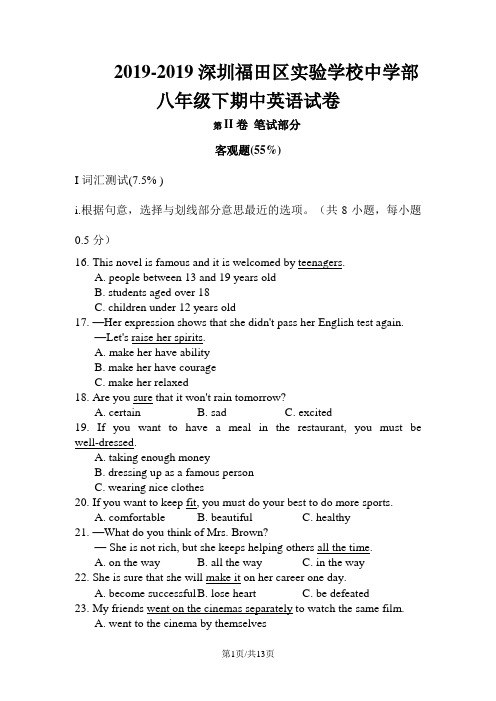
2019-2019深圳福田区实验学校中学部八年级下期中英语试卷第II卷笔试部分客观题(55%)I词汇测试(7.5% )i.根据句意,选择与划线部分意思最近的选项。
(共8小题,每小题0.5分)16. This novel is famous and it is welcomed by teenagers.A. people between 13 and 19 years oldB. students aged over 18C. children under 12 years old17. —Her expression shows that she didn't pass her English test again.—Let's raise her spirits.A. make her have abilityB. make her have courageC. make her relaxed18. Are you sure that it won't rain tomorrow?A. certainB. sadC. excited19. If you want to have a meal in the restaurant, you must be well-dressed.A. taking enough moneyB. dressing up as a famous personC. wearing nice clothes20. If you want to keep fit, you must do your best to do more sports.A. comfortableB. beautifulC. healthy21. —What do you think of Mrs. Brown?— She is not rich, but she keeps helping others all the time.A. on the wayB. all the wayC. in the way22. She is sure that she will make it on her career one day.A. become successfulB. lose heartC. be defeated23. My friends went on the cinemas separately to watch the same film.A. went to the cinema by themselvesB. didn't go to the. cinema togetherC. went to the cinema secretlyii从下面每小题的A、B、C三个选项中选出最佳答案。
2017~2018学年广东深圳福田区深圳实验学校初中部初二下学期期中英语试卷(学生版)
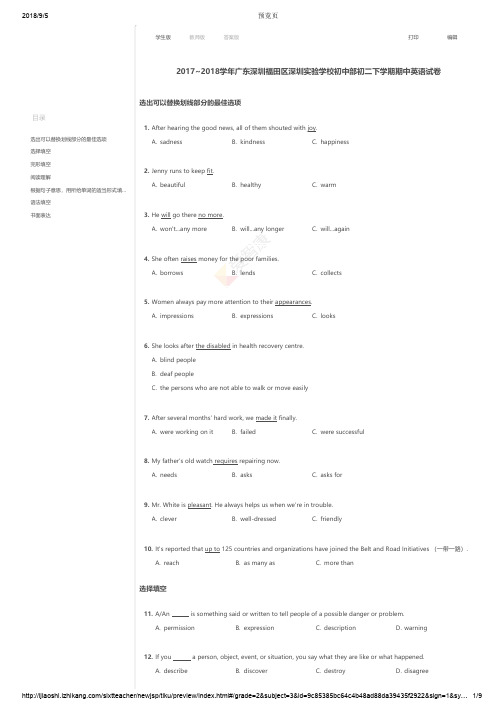
A. impressions
B. expressions
C. looks
6. She looks after the disabled in health recovery centre. A. blind people B. deaf people C. the persons who are not able to walk or move easily
in a short time.
19. — I think you should stop
him in English.
— I see. He can't understand English at all. Let me try in Chinese.
A. talk to
B. to talk to
in the classroom.
A. sing
B. to sing
C. singing
/sixtteacher/newjsp/tiku/preview/index.html#/grade=2&subject=3&id=9c85385bc64c4b48ad88da39435f2922&sign=1&sy… 2/9
15. A/An
means something that one is not able to do easily.
A. difference
B. suggestion
C. difficulty
D. impression
16. She practices A. dance
every day. B. to dance
news.
25. — She just
深圳实验学校 八年级下学期英语期中考试
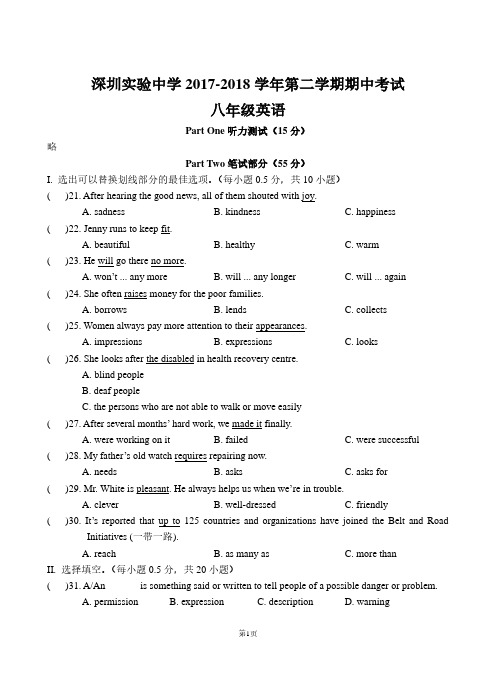
深圳实验中学2017-2018学年第二学期期中考试八年级英语Part One听力测试(15分)略Part Two笔试部分(55分)I. 选出可以替换划线部分的最佳选项。
(每小题0.5分,共10小题)( )21. After hearing the good news, all of them shouted with joy.A. sadnessB. kindnessC. happiness( )22. Jenny runs to keep fit.A. beautifulB. healthyC. warm( )23. He will go there no more.A. won’t ... any moreB. will ... any longerC. will ... again( )24. She often raises money for the poor families.A. borrowsB. lendsC. collects( )25. Women always pay more attention to their appearances.A. impressionsB. expressionsC. looks( )26. She looks after the disabled in health recovery centre.A. blind peopleB. deaf peopleC. the persons who are not able to walk or move easily( )27. After several months’ hard work, we made it finally.A. were working on itB. failedC. were successful ( )28. My father’s old watch requires repairing now.A. needsB. asksC. asks for( )29. Mr. White is pleasant. He always helps us when we’re in trouble.A. cleverB. well-dressedC. friendly( )30. It’s reported that up to 125 countries and organizations have joined the Belt and Road Initiatives (一带一路).A. reachB. as many asC. more thanII. 选择填空。
2021-2022学年广东省深圳市深圳中学八年级下学期期中英语试题
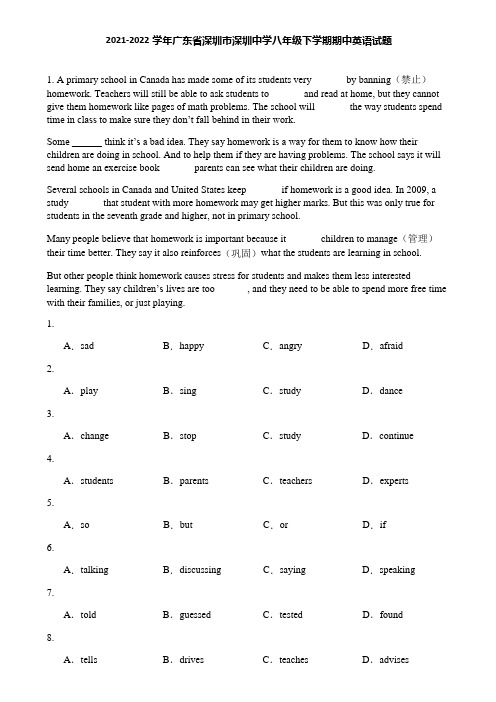
2021-2022学年广东省深圳市深圳中学八年级下学期期中英语试题1. A primary school in Canada has made some of its students very ______ by banning(禁止)homework. Teachers will still be able to ask students to ______ and read at home, but they cannot give them homework like pages of math problems. The school will ______ the way students spend time in class to make sure they don’t fall behind in their work.Some ______ think it’s a bad idea. They say homework is a way for them to know how their children are doing in school. And to help them if they are having problems. The school says it will send home an exercise book ______ parents can see what their children are doing.Several schools in Canada and United States keep ______ if homework is a good idea. In 2009, a study ______ that student with more homework may get higher marks. But this was only true for students in the seventh grade and higher, not in primary school.Many people believe that homework is important because it ______ children to manage(管理)their time better. They say it also reinforces(巩固)what the students are learning in school.But other people think homework causes stress for students and makes them less interested ______ learning. They say children’s lives are too ______, and they need to be able to spend more free time with their families, or just playing.1.A.sad B.happy C.angry D.afraid2.A.play B.sing C.study D.dance3.A.change B.stop C.study D.continue4.A.students B.parents C.teachers D.experts5.A.so B.but C.or D.if6.A.talking B.discussing C.saying D.speaking7.A.told B.guessed C.tested D.found8.A.tells B.drives C.teaches D.advises9.A.at B.in C.on D.for10.A.free B.interesting C.relaxing D.busy2. As we grow old, our memory fades(衰退). How can we improve it? Here are some ways for us to have a try.Exercise regularlyThat’s right, and we mean physical exercise. Research has found that leading a sedentarylifestyle can also lead to memory loss. So stand up, put on comfortable shoes, go outside and start to exercise. It’s good for both your mind and study.Play video gamesYes, you heard us. Pick the controller up and spend a few hours playing your favorite video game. It’s good for your mind, according to a recent study. It can help improve the functioning (功能)of the memory-related areas in the brain. But don’t go overboard, too much of a good thing can be bad for you.Eat your vegetablesIt’s a well-known fact that eating vegetables can help keep you healthy, and that includes your brain. Studies show that fruits and vegetables can help lower the stress in your brain as well as help keep your brain working healthily.Reduce(减少)stressStress, especially at high levels, is harmful to our memory. So slow down and make yourself relaxed. You can spend a few moments in quiet meditation(冥想). Taking a walk and taking small breaks during work are all helpful.1. What is a sedentary lifestyle like?A.Doing sports every day. B.Having no time to sleep.C.Spending a lot of time sitting. D.Working for a long time.2. What’s the writer’s advice on playing video games?A.Don’t play them too much.B.Play them before bedtime.C.Play them with friends. D.Don’t play them at night.3. Which of the following can NOT help reduce stress?A.Having a rest. B.Taking a walk. C.Thinking quietly. D.Working hard. 4. How can we improve our memory according to the passage?A.By eating more meat. B.By taking some medicine.C.By doing sports often. D.By sleeping more.5. What is the best title of the passage?A.The reasons for memory loss B.How to fight memory lossC.The ways to live a healthy life D.How to improve old people’s life3. Do you want to cook lunch at your desk? It seems a surprising and impossible idea, doesn’t it? But Ms Yeah just makes it happen. Ms Yeah is from Chengdu and she is really famous on the Internet because of her videos of cooking in the office. Many young people call her “The Office Cook”. Here are her answers to some questions from the e-friends.How did you get the idea of cooking by using office things?One day, I saw a workmate using an electric iron(电熨斗)on his shirt. Then I wanted to know if I could cook beef pieces by putting an electric iron on them. That is how I got my first video idea.How do you feel about being so popular now?I really didn’t expect so many people all over the world would like my videos. In fact, I still can’t believe it. I cooked almost all traditional Chinese food. I thought only Chinese people were interested. But now I know delicious food becomes international(国际的)and everybody loves it.What message would you like to send to young people?I did some things in the office that young people want to do but aren’t able to. My videos make people laugh, and I hope they can become happy and see the funny side of life when they watch these videos.1. Where did Ms Yeah get the idea of cooking in the office?A.From her workmate. B.From the videos on the Internet.C.From her parents. D.From the questions of her e-friends.2. How did Ms Yeah feel after being popular?A.Sad. B.Excited. C.Surprised. D.Cheerful.3. What can we learn from the last paragraph?A.Ms Yeah hopes people keep trying.B.An excellent person is good at making people laugh.C.Ms Yeah hopes people can see good things in their life.D.Young people should always try to do impossible things.4. Which of the following is TRUE?A.Ms Yeah is famous as “The Office Cook”.B.In the beginning, Ms Yeah believed many people would love her video.C.Ms Yeah found that only Chinese people were interested in Chinese food.D.Ms Yeah cooked almost all the Western food.5. What can we learn about Ms Yeah from the passage?A.Her dream is to be a famous cook. B.She is willing to try new ideas and things.C.She wants more people to cook in theoffice.D.She doesn’t like making things herself.4. Mr Wang’s daughter who lives in Hainan has never seen snow in her life. It’s her dream to have a snowman of her own.To fulfill his daughter’s wish, instead of travelling thousands of miles, Mr Wang turned to the Internet. On a website, he found a seller who could make the wish come true.The seller who lives in Heilongjiang Province made a snowman wearing a red hat and scarf with a note beside the snowman, reading “Papa & Mama love you”. She took pictures and recorded videos of the snowman and sent them to Mr Wang. Mr Wang’s girl was so happy that night when she saw the pictures and videos.Now, the Internet is not only a place for people to get information, but also a place to meet their needs. It connects people from different places with different needs in the fastest time and then helps trade to be made online. A study shows the number of online payment users has reached 805 million. That’s 85.7% of the Internet users in China. These Intern et users ask for different kinds of services, like making travel plans, asking for a driver, shopping for them abroad, taking care of their pets and so on.The services help people have a better life. Also they help create new jobs. Those service providers can make money while enjoying a more meaningful life. However, some people have concerns that the services may lead to acts that are against the law, for example, paying people to cheat(作弊)on an exam. But I believe that with some regulations(法规)the Internet service will go in a good way.1. What did Mr Wang do when he knew about his daughter’s dream?A.He travelled thousands of miles with her. B.He got some helpful ideas on the Internet.C.He paid someone online to make a snowman. D.He thought of moving to Heilongjiang Province.2. Why was Mr Wang’s daughter happy?A.Because her wish came true. B.Because she knew her parents love her.C.Because she received a red hat and scarf. D.Because she made a snowman on her own.3. What does the fourth paragraph mainly talk about?A.The number of Internet users is growing.B.Trade on the Internet has increased quickly.C.The Internet has helped meet people’s needs.D.The Internet has provided a lot of information.4. What does the underlined word “concerns” mean in English?A.plans B.worries C.questions D.hopes 5. What is the writer’s attitude(态度)towards the future of the Internet service?A.He isn’t sure about it. B.He is worriedabout it.C.He isn’tinterested in it.D.He is hopefulabout it.5. 阅读短文,从短文下面方框中的六个句子中选择五个还原到短文中,使短文意思通顺、内容完整。
广东省深圳学校2021年八年级英语期中教学质量检测试题卷 牛津版
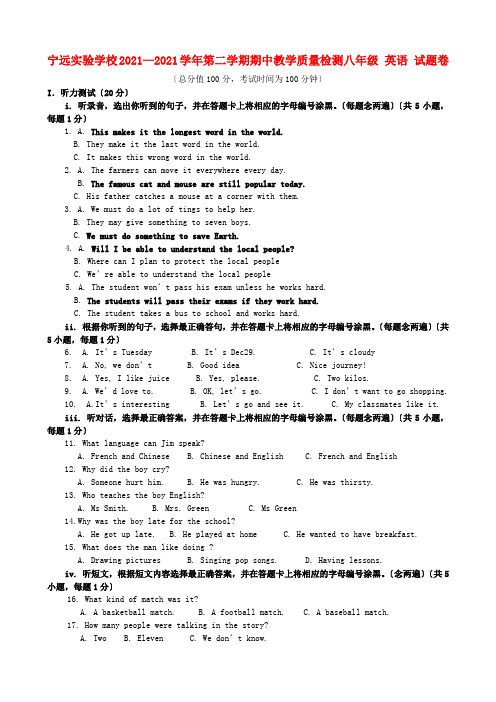
宁远实验学校2021—2021学年第二学期期中教学质量检测八年级英语试题卷〔总分值100分,考试时间为100分钟〕I.听力测试〔20分〕i. 听录音,选出你听到的句子,并在答题卡上将相应的字母编号涂黑。
〔每题念两遍〕〔共5小题,每题1分〕1. A. This makes it the longest word in the world.B. They make it the last word in the world.C. It makes this wrong word in the world.2. A. The farmers can move it everywhere every day.B. The famous cat and mouse are still popular today.C. His father catches a mouse at a corner with them.3. A. We must do a lot of tings to help her.B. They may give something to seven boys.C. We must do something to save Earth.4. A. Will I be able to understand the local people?B. Where can I plan to protect the local peopleC. We’re able to understand the local people5. A. The student won’t pass his exam unless he works hard.B. The students will pass their exams if they work hard.C. The student takes a bus to school and works hard.ii. 根据你听到的句子,选择最正确答句,并在答题卡上将相应的字母编号涂黑。
- 1、下载文档前请自行甄别文档内容的完整性,平台不提供额外的编辑、内容补充、找答案等附加服务。
- 2、"仅部分预览"的文档,不可在线预览部分如存在完整性等问题,可反馈申请退款(可完整预览的文档不适用该条件!)。
- 3、如文档侵犯您的权益,请联系客服反馈,我们会尽快为您处理(人工客服工作时间:9:00-18:30)。
深圳实验中学2017-2018学年第二学期期中考试八年级英语Part One听力测试(15分)略Part Two笔试部分(55分)I. 选出可以替换划线部分的最佳选项。
(每小题0.5分,共10小题)( )21. After hearing the good news, all of them shouted with joy.A. sadnessB. kindnessC. happiness( )22. Jenny runs to keep fit.A. beautifulB. healthyC. warm( )23. He will go there no more.A. won’t ... any moreB. will ... any longerC. will ... again( )24. She often raises money for the poor families.A. borrowsB. lendsC. collects( )25. Women always pay more attention to their appearances.A. impressionsB. expressionsC. looks( )26. She looks after the disabled in health recovery centre.A. blind peopleB. deaf peopleC. the persons who are not able to walk or move easily( )27. After several months’ hard work, we made it finally.A. were working on itB. failedC. were successful ( )28. My father’s old watch requires repairing now.A. needsB. asksC. asks for( )29. Mr. White is pleasant. He always helps us when we’re in trouble.A. cleverB. well-dressedC. friendly( )30. It’s reported that up to 125 countries and organizations have joined the Belt and Road Initiatives (一带一路).A. reachB. as many asC. more thanII. 选择填空。
(每小题0.5分,共20小题)( )31. A/An ______ is something said or written to tell people of a possible danger or problem.A. permissionB. expressionC. descriptionD. warning( )32. If you ______ a person, object, event, or situation, you say what they are like or what happened.A. describeB. discoverC. destroyD. disagree( )33. A ______ means a movement that you make with your hands, your head or your face to show a particular meaning.A. messageB. languageC. communicationD. gesture( )34. If something ______ you, it makes you get interested in it.A. satisfiesB. remindsC. attractsD. matches( )35. A/An ______ means something that one is not able to do easily.A. differenceB. suggestionC. difficultyD. impression( )36. She practices ______ every day.A. danceB. to danceC. dancingD. danced( )37. This movie made a good impression ______ me.A. forB. forwardC. onD. to( )38. Because of the Internet, different kinds of information ______ in a short time.A. can be learnedB. is learnedC. can learnD. was learned( )39. —I think you should stop ______ him in English.—I see. He can’t understand English at all. Let me try in Chinese.A. talk toB. to talk toC. to talking toD. talking to( )40. Now it’s much easier to shop online. When your order is ready, the things you want to buy ______ to you soon.A. sendB. were sentC. are sendingD. will be sent( )41. —Do you climb mountains every day?—Yes, ______ a little exercise. I’m so out of shape.A. gettingB. getC. gotD. to get( )42. Listen! I hear someone ______ in the classroom.A. singB. to singC. singingD. sang( )43. He lost his key. It made him ______ in the cold to wait for his parents’ return.A. to stayB. stayedC. staysD. stay( )44. He was ______ when hearing the ______ news.A. excited; excitedB. excited; excitingC. exciting; excitingD. exciting; excited( )45. —She just ______ the clothes she washed outside.A. hung; wetB. hang; wetC. hung; dryD. hanging; dry( )46. In order ______ for the meeting, my father forced himself to get up early this morning.A. being lateB. to be lateC. not being lateD. not to be late( )47. I wanted to see the Beijing Opera, so Linda offered ______ me to watch an opera.A. tookB. takesC. to takeD. taking( )48. —What would you like to do to relax yourself?—I prefer ______ basketball rather than ______ magazines.A. playing; readingB. to play; to readC. play; readD. to play; read( )49. —Tom, will you go to Jenny’s birthday party this Sunday?—I’m not sure. Because I ______ so far.A. haven’t invitedB. wasn’t invitedC. haven’t been invitedD. will be invited( )50. —I’m sorry I can’t pick Tom up with you, though I look forward to ______ him.—Why?—Because I am busy ______.A. see; workingB. seeing; workingC. seeing; to workD. see; to workIII. 完形填空。
(每小题1.5分,共10小题)This story will warm you better than a coffee on a cold winter day.One day, my friend and I ___51___ a little coffee house and ordered two cups of coffee. ___52___ we were waiting, two young men came in and began to order, “Five cups of coffee, please. Two of them for us and three suspended (待用). They ___53___ for their order, took the two and left. I asked my friend, “What are those ‘suspended’ coffees?” ___54___ giving me the answer, he told me to wait and see.Some more people came. Two girls ___55___ one coffee each, paid and went away. Then came three lawyers who paid for seven coffees –– three for themselves and four suspended. While I still wondered ___56___ the suspended coffees were, I enjoyed the sunny weather and the beautiful view ___57___ the coffee house. Suddenly a poor man like a beggar came into the coffee house. He kindly ordered a suspended coffee and sat there ___58___ it.At that moment, I knew the meaning of the suspended coffees. It’s simple –– people pay the coffee in advance (预先) for someone who cannot ___59___ it. The tradition with the suspended coffees started in Italy, but it has spread all over the world. Meanwhile, I understood suspended( )51. A. walked B. went C. ran D. entered( )52. A. After B. Before C. While D. As soon as( )53. A. asked B. spent C. cost D. paid( )54. A. Because of B. Instead of C. As for D. But( )55. A. asked for B. said to C. thanked for D. looked up( )56. A. when B. what C. why D. where( )57. A. in the front of B. behind C. in front of D. at the back of( )58. A. to drink B. to eat C. drank D. ate( )59. A. sell B. want C. buy D. afford( )60. A. hottest B. warmer C. warmth D. hotterIV. 阅读理解。
